Groton School
The Quarterly • Winter 2023
THE OF A CHARACTER

The understated, scene-stealing power of William Camp ’82, page 16
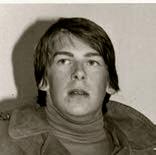
Groton School • The Quarterly Winter 2023 • Volume LXXXIV , No. 1
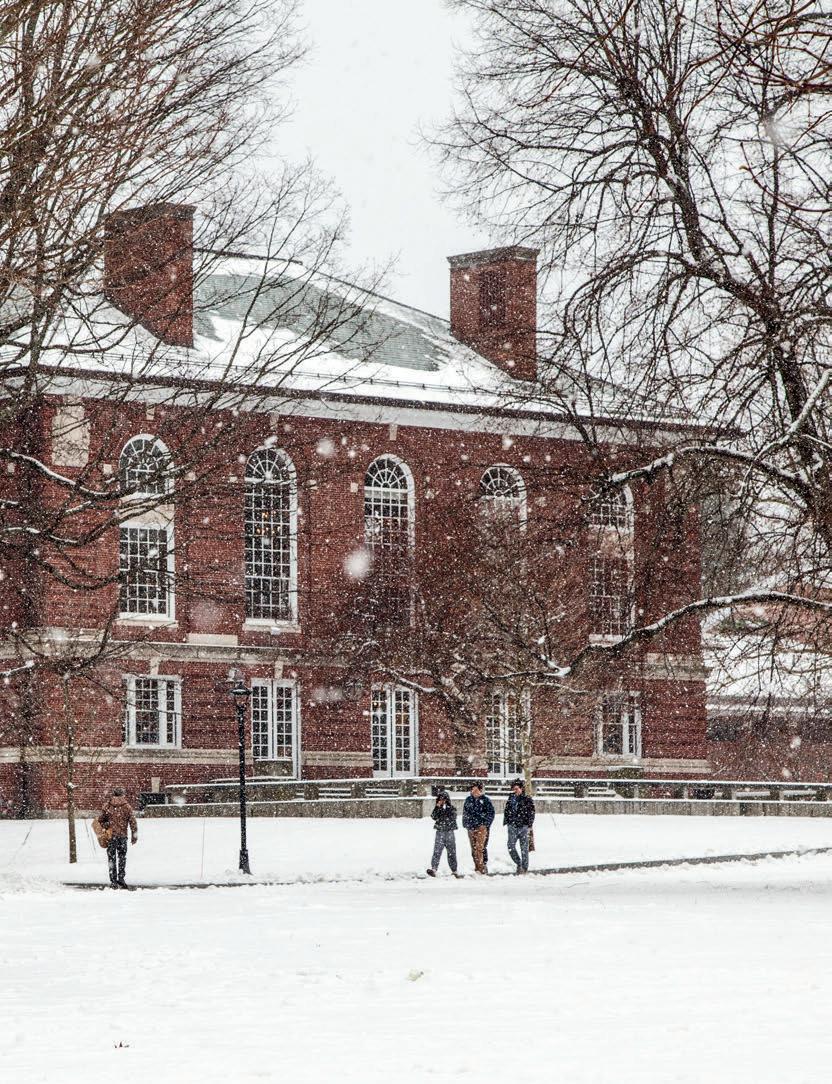
The Heart of a Character
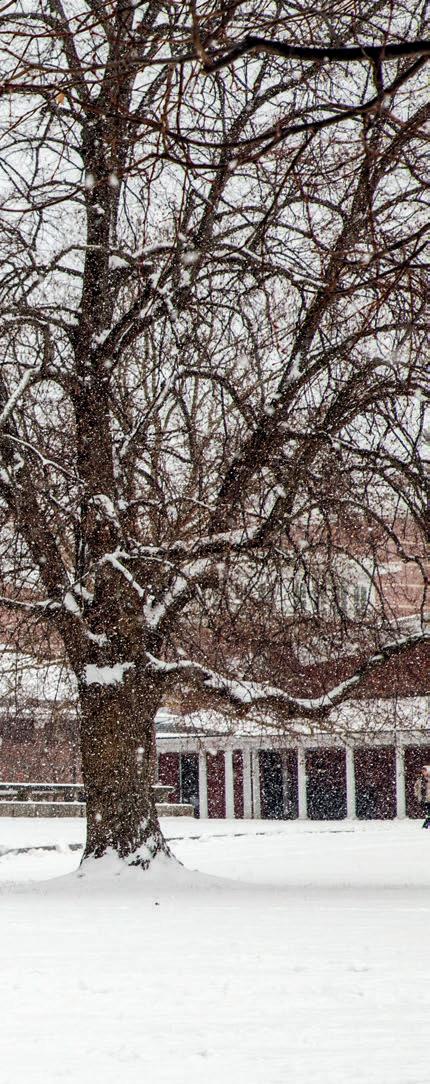
Bill Camp has become one of Hollywood’s most valuable supporting actors, on both film and stage. “I would go see him do absolutely anything,” says playwright Tony Kushner, giant of the American theater. “I am in awe of him.” page 16
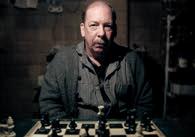
D E P A R T MENT S
The Quarterly Winter 2023 • Volume LXXXIV, No. 1
Groton School
2 Message from the Headmaster 3 Circiter / Around the Circle 12 Personae / Profiles 25 Voces / Chapel Talks 33 De Libris / New Releases 34 Grotoniana / Athletics 42 Grotoniana / Arts 45 In Memoriam 49 Form Notes
Christopher Temerson
Cover photo by Brad Trent
Message from the Headmaster
ON A HOT and humid day in late July 2012, I drove down Route 495 in heavy traffic, on my way to the Circle. I was heading to Groton School to meet with James Bundy ’77, and I had no idea how our lives would change as a result of this meeting. About halfway to Groton, I realized that the traffic was bad enough to delay my arrival by at least an hour. I called James to cancel the meeting and he insisted that he would wait for me, which was my first sign that something was afoot. Upon reaching campus, I was greeted warmly by James and, despite the heat, we embarked on a walk. Pausing in front of St. John’s Chapel, James became emotional when telling me, with a shaky voice, that he wanted the school to “continue to sing.” At first, I was confused by James’ emotion about singing when that is exactly what one would expect to happen in Chapel. It was then that he informed me that he was chair of the Leadership Succession Committee, which was searching for a new headmaster for Groton, and he was hoping I would enter the search. His analogy was suddenly clear to me, and I was moved by his comparison of the work of educators to joyful singing. I decided to enter the search and, just a year later, in July 2013, I was sitting in my new office in the Schoolhouse. The first phone call I received was from Bill Polk ’58, Groton’s sixth headmaster, and the rest, as they say, is history.
As we approach the completion of our tenth year at Groton, Vuyelwa and I are filled with gratitude for the support of this remarkable community. We can recall many moments of growth and success during our time here, but what is most meaningful for us are the relationships with the incredible students we have come to know. These children arrive at Groton with enormous potential and spend some of their most formative years learning and growing on the Circle. As we follow our students in their lives beyond Groton, we are filled with pride for all they accomplish and for the talents and gifts they bring to the world. We also take great pride in the way in which this entire community has rallied in support of continuing to enrich the Groton experience while making it both more inclusive and more accessible.
Editor Nichole Bernier
Design
Irene HL Chu
We are grateful to those who saw fit to honor Groton with the “10 for 10” campaign, marking our tenth year on the Circle by striving to raise $10 million to build an outdoor track and a second turf field. To those who answered the call so quickly, thank you! As a result of this generosity, we will now be able to break ground on this project in May and, starting next spring, Groton students will finally be able to host a home track meet and will no longer need to drive to neighboring towns to practice. The new turf field will ensure that fewer athletic events will be canceled due to unplayable conditions.
With great momentum from the successful completion of the first GRAIN initiative, we have exceeded our GRAIN 2.0 goal and have made significant progress in tuition cost containment as a result. We currently have the lowest tuition among 40 of our peer schools and will remain the lowest for the second consecutive year in 2023–24. Consequently, what was once the “talented missing middle” is now the “talented present middle” here at Groton. We also continue working toward our goal to fully fund Groton’s summer acceleration and enrichment program, GRACE. We are grateful to all those who make these dreams for Groton students a reality by supporting these projects. They are all examples of the implementation of the board’s Strategic Framework 2030, which focuses on inclusion and belonging.
Nearly ten years ago, when Vuyelwa and I first embraced the idea of Groton singing, we could not have imagined how joyful and vibrant the song could be. We are humbled to help this community continue singing for (at least) a few more years.
Senior Editorial Advisors
Sean Kerrigan
Kathleen M. Machan
Christopher Temerson
Form Notes Editor Jessica M. Hart
 Temba Maqubela Headmaster
Temba Maqubela Headmaster
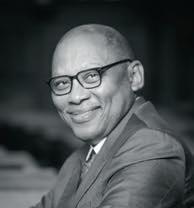
Advisory Committee
Amily E. Dunlap
Kimberly A. Gerighty
Giulia King
Allison S. MacBride
John D. MacEachern P’10, ‘14, ’16
Paul Ryan
Editorial Offices
The Schoolhouse Groton School Groton, MA 01450 978 - 448 -7506 quarterly@groton.org
Send feedback, ideas, or letters to the editor to quarterly @groton.org.
Other School Offices
Alumni Office: 978 - 448 -7520

Admission Office: 978 - 448 -7510
Groton School publishes the Groton School Quarterly three times a year, in late summer, winter, and spring, and the Annual Report once a year, in the fall.
2 Groton School Quarterly Winter 2023
Mitch Weiss
POET RICHARD BLANCO SHARES INSIGHT, INSPIRATION IN DAY-LONG CAMPUS VISIT
“Made in Cuba, assembled in Spain, and imported to the United States.”
Not one to waste words, acclaimed poet Richard Blanco summed up his heritage and introduced his enduring theme of “home” with that phrase during an all-school lecture on September 29.
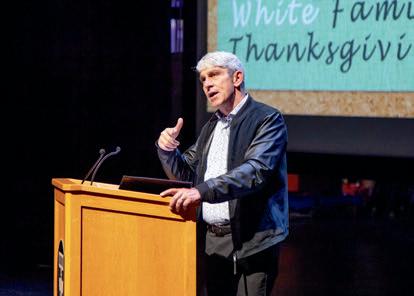
“When I was forty-five days old, I belonged to three countries, and yet to none,” he said, as he launched into stories of his life, shared through both narrative and poems that untangle his search for identity as Cuban, gay, and American.
Mr. Blanco explained that poets are seeking answers to unanswerable questions, in his case the quest to understand where home is and what home means. “Every poet is writing one poem all his life,” he said, explaining that he has come to realize that, for him, home encompasses family, community, sexuality, and cultural identity.
The poet, author of several books, gained notoriety after reading “One Today” at President Obama’s second inauguration. That poem, a sweeping look at the U.S. and its people, includes this passage: “Silver trucks heavy with oil or paper bricks or milk, teeming over highways alongside us, on our way to clean tables, read ledgers, or save lives to teach geometry, or ring-up groceries as my mother did for twenty years, so I could write this poem.”
Mr. Blanco’s mother and grandmother are key characters in his poetry. He told the Groton community that his mother “should have been the one to read that poem in Washington because my story wouldn’t have been possible without her story.”
His relationship with his grandmother his “best friend”— was painfully complicated. Among the poems
he read at Groton were “Mother Country,” “Looking for the Gulf Motel,” and “Queer Theory: According to My Grandmother,” which showcases his abuela’s litany of homophobic rules.
Mr. Blanco said that the journey of poetry writing not knowing quite where a poem may lead motivates him. “Why I keep in writing is the discovery. I don’t know what I’m going to discover ,” he said, adding, “That’s what the reader really responds to the discovery.”
After the all-school presentation, Mr. Blanco spoke in the Sackett Forum all day long, through every academic period, then met in the evening with the student-run Poetry Club and Literary Club. He lived up to his title of Education Ambassador of the Academy of American Poets.
“Mr. Blanco shared invaluable knowledge on the writing process and his journey as a writer,” said Poetry Club
CORRECTION :The vintage varsity letter sweaters were incorrectly identified in “Circling Back,” on the back cover of the Fall 2022 Quarterly Football players wore sweaters with a red GS, baseball players wore a red G, and crew members sported sweaters with a black G. We regret the error.
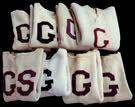
co-head Sophia Bay ’23, “but he also unraveled the essence of poetry, allowing students to garner a deeper understanding of what it means to be a poet beyond the pen and paper.”
Throughout the day, students asked him questions on everything from his process (“Never put an idea before a poem; the idea will emerge from really being honest and authentic”) and his nerves at the presidential inauguration (“Even Beyonce was nervous”) to how being an engineer influences his writing (“A lot of the rigor of math I use in writing”).
“You can do more than one thing,” he assured students. “The most interesting things that happen in life are at the intersection of things.”
Literary Club co-head Fiona Reenan ’23 said that students appreciated Mr. Blanco’s funny anecdotes and found him inspiring. “He really deepened our understanding of what it means to be a poet both as a profession and as a person,” she said.
The poet was as relatable as his emphasis on home a theme that sparked conversation during mid-day meetings between students and their advisors. As Mr. Blanco who has looked for home in places including Miami, Connecticut, and Brazil observed, “The drive to find home is universal.”
CIRCITER www.groton.org 3
Richard Blanco speaks to students and faculty during an all-school lecture on September 29, 2022
Christopher Temerson
BACK TO NORMAL FOR SURPRISE HOLIDAY
When Groton’s senior prefects appeared in the traditional green after chapel on October 6, they signaled not only a much-anticipated Surprise Holiday and a break in routine, but also the first Surprise Holiday since 2019 with off-campus activities in Boston and Cambridge.
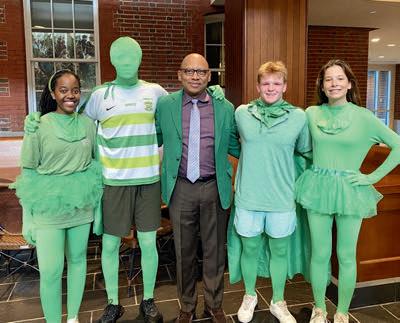
Senior prefects always devise creative ways to announce the special day each term. This time, they dressed in green and hid in a storage container outside the Schoolhouse, then popped out as students walked by. Spontaneous joy erupted.
Students then gathered for announcements in the Sackett Forum, where Headmaster Temba Maqubela was waiting in the green jacket a Surprise Holiday icon. Later in the morning, students piled into buses to Boston and Cambridge and to a nearby mall. Fall weather in the 70s beckoned them to Back Bay and Harvard Square, though some chose to stay on the Circle and relax.
Surprise Holiday is not just a day off of classes each term or a chance to travel to the city with friends; it is Groton legend and tradition. It is the most anticipated day of the term and boy was it nice to have it back.
“The last real Surprise Holiday we had was when I was in Third Form, and now I’m prefecting the Third Form,” said Senior Prefect Maya Luthi ’23. “So seeing them getting excited when they heard rumors was really fun.”
Groton School has been moving back toward normalcy after strict COVID protocols. “This Surprise Holiday is evidence that Groton is back to normal honoring all the traditions, the way it should be,” said Headmaster Temba Maqubela. “Happy Surprise Holiday!”
DISTINGUISHED DIPLOMAT SPEAKS WITH GROTON MODEL UN
The Groton Model United Nations Club hosted a conversation over Zoom on January 11 with Dr. Han Seung-soo, a South Korean politician and diplomat who served both as South Korea’s prime minister and as ambassador to the United States, as well as at the United Nations in various posts.
Organized by the student heads of the Groton Model UN club, Dr. Han’s talk was an opportunity for club members and other interested students to ask questions of a veteran diplomat and gain significant insight into international relations and the United Nations.
Dr. Han was elected president of the United Nations General Assembly the day after the terror attacks on the United States on September 11, 2001. In response to a question by one student, Dr. Han said that his most significant career achievement was his successful efforts to keep the UN focused and productive in the wake of those attacks.
When asked whether the realities of the world today required that the UN Security Council be reformed, he responded that he was frustrated by the unwillingness of some members of the UN to do just that. Twice during the conversation, Dr. Han mentioned that the brutal war in Ukraine has polarized the international community to a degree not seen since the Cold War.

When asked by another student what strategies and tactics were crucial to a successful career in diplomacy, Dr. Han replied that a successful diplomat and politician is respectful of those with whom they disagree and is willing to compromise and “find the middle ground.” He also told students that the greatest global challenges facing humanity remain peace, economic development, and human rights. He called global warming the fourth biggest challenge.
In his concluding remarks, Dr. Han indicated that he was optimistic about the future, largely because he felt that most young people around the world seem committed to resolving these challenges and have the intelligence and resources to do so. He also encouraged students to learn more languages and more about international law and the politics of international relations.
Sixth Former Zhining Zhao said that he found Dr. Han to be the consummate statesman, remarking on his “patience,” “humble attitude,” and “kind and gentle manner.”
Tommy Lamont, Model UN faculty advisor
444 Groton School Quarterly Winter 2023
Senior Prefects from left, Amber Gumira ‘23, Osric King ‘23, Brayden Haggerty ‘23, and Maya Luthi ‘23 with Headmaster Maqubela
CONGRATULATIONS TO GROTON’S DIVISION 1 ATHLETES!
Sixth Formers Karenna Beckstein, Hugh Carlin, Allie Kandel, and Dylan Vigue celebrated their athletic commitments to Division 1 universities on November 9, National Letter of Intent Signing Day.
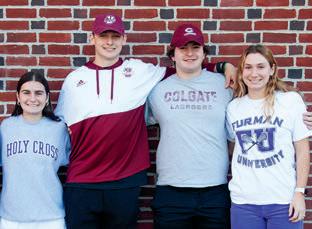
Karenna, an all-around impact player on the soccer field, has signed a letter of intent to play at Holy Cross. Hugh and Allie both signed letters of intent to continue their lacrosse careers Hugh, a face-off specialist, goes to Colgate University, and Allie, who plays attack, will be at Furman University. Look for pitching ace Dylan Vigue on the mound for the University of Massachusetts baseball team.
“Groton is especially proud of our NCAA D1 athletes, as their signatures on these letters of intent symbolize so many traits representative of all Groton students: persistence, grit, hard work, leadership, integrity, dedication, and humility,” said Athletic Director Bob Low. “The entire Groton community is proud of these D1 standouts and of all the athletes who wear the Groton School jersey.”
Groton looks forward to cheering on all the Zebras when they take their considerable talents to college.
FREDERICK LAW OLMSTED: DESIGNING AMERICA, DESIGNING GROTON
designer of Groton School’s campus at the start of his Circle Talk on Tuesday, October 11. Cotton’s excitement at being at Groton was palpable, as was his unmatched enthusiasm for, and knowledge about, Olmsted and his remarkable achievements.
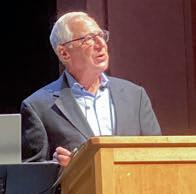
short supply as America’s urban centers industrialized and grew rapidly.
“He works like a dog all day and sits up nearly all night, doesn’t go home to his family for five days together, works with steady feverish intensity until four in the morning, sleeps on a sofa in his clothes, and breakfasts on strong coffee and pickles.”
Historian and filmmaker Laurence Cotton was describing famed landscape architect Frederick Law Olmsted the
Armed with dozens of photographic images, Cotton took a deep dive into the life and work of Frederick Law Olmsted, recognized as the United States’ most important and famous landscape architect. Cotton, the consulting producer on the 2014 PBS documentary Frederick Law Olmsted: Designing America, emphasized Olmsted’s curiosity, hard work, and dedication to creating landscapes that reflected and nourished the democratic nature of American society and preserved the beauty of the North American landscape.
The filmmaker pointed out, for example, that Olmsted’s designs for New York City’s Central Park and Prospect Park were intended to give the city’s working class residents the opportunity to enjoy the benefits of fresh air and the natural world, which during the nineteenth century were increasingly in
Cotton explained how such views as well as Olmsted’s support for the abolitionist movement; his efforts to recruit African American men for the Union army during the Civil War; and his supervision of the U.S. government’s Sanitary Commission, the precursor to the American Red Cross mark Olmsted as a contemporary, a friend, and an ally of other progressive thinkers who lived in New England and New York during the decades before and after the Civil War, including Ralph Waldo Emerson and Henry David Thoreau.
Cotton, like the subject of his talk, is a bit of a Renaissance Man. He is a public historian, a conservationist, a writer, and a producer. Born and raised amid Boston’s own extensive Olmsted legacy, Cotton now lives in Portland, Oregon, where he has been deeply involved in major land conservation and beautification work. Cotton’s talk at Groton is one of dozens of talks about Olmsted that he has delivered across the United States this year in honor of the bicentennial of Olmsted’s birth.
Tommy Lamont
CIRCITER www.groton.org 5
From left, Karenna Beckstein ‘23, Dylan Vigue ‘23, Hugh Carlin ‘23, and Allie Kandel ‘23.
Christopher Temerson
Historian and filmmaker Laurence Cotton delivered a Circle Talk on October 11, 2022.
GROTON DEBATER QUALIFIES FOR WORLD COMPETITION
Another Groton School debater has qualified to compete in the world championship, highlighting a tournament that included several first-place finishes for Groton.
Debating Society Co-President Rowen Hildreth ‘23 is heading to the World Individual Debating and Public Speaking Championship in Durban, South Africa, in March, after scoring as the best individual
speaker at a November 6 tournament at St. Paul’s School. Eight interscholastic debate tournaments are designated as qualifier tournaments for the world competition, including the weekend debate at St. Paul’s, said Michael Gnozzio ’03, Groton math teacher and debate advisor.
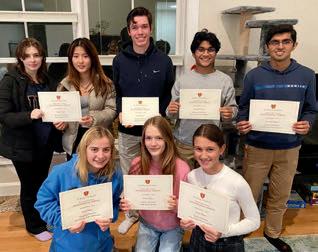
Rowen was among many debaters who represented Groton well. Among the advanced debaters, Rowen and Mimi Kovriga ‘24 placed first among those arguing for the affirmative, and Arjun Ray ‘24 and Husayn Ladha ‘24 placed second among teams arguing for the negative. Mimi also finished as the third best individual speaker. The topic: whether the U.S. should increase military aid to Ukraine.
Groton’s four-person team also placed first, with Mimi and Rowen joining Amy Ma ‘23 and Alisa Gulyansky ‘24 for the victory. In the novice division, Leah-Felicity Bay ‘27 and Lena Aloise ‘27 placed first together, and Leah also placed first as the best overall novice speaker.
“In the days leading up to the tournament, all of the students worked very hard to get a detailed understanding of how the war in Ukraine is progressing, and it is a testament to the Debating Society officers’ strong leadership that we had so much success on both sides of the case,” said Mr. Gnozzio. “Rowen, in particular, has a wonderfully deep grasp of both international and domestic politics, and the careful attention he puts into crafting well-supported arguments makes him a very formidable debater. It will be very exciting to see him compete at Worlds!”
Other Grotonians who have competed in Worlds are Steven Pang ’22, Jiacheng Kang ’22, Sebastian Osborn ’06, Stephen McCarthy ’06, Jaideep Chawla ‘04, Michael Gnozzio ‘03, and Brookes Brown ‘00. Brookes competed in Cyprus, where she placed first in the debating portion and second as all-around speaker.
GROTON SCHOOL QUARTERLY WINS CASE AWARD
The Groton School Quarterly has won a CASE (Council for Advancement and Support of Education) Best of District I Award.
Submitted for the award were two issues from the 2020–21 school year, each focusing on the pandemic in very different ways. As the entry pointed out, “Normally two consecutive issues would never touch upon a similar theme, but nothing was normal about this pandemic.”
The Fall 2020 Quarterly, “Rising to the COVID Challenge,” profiled a wide array of alumni carrying out the school’s ethos of service all helping to improve lives affected by COVID. The stories introduced a doctor for the COVID-devastated Navajo nation, an inner-city chaplain, frontline health workers, a whiskey distiller making sanitizer, and others delivering the message that Grotonians were making a difference during the most challenging of times. The stories spanned generations, so
many readers were unexpectedly inspired by someone they knew.
The Winter 2021 Quarterly, “Protecting the Circle: A Glimpse of Groton Life During the Pandemic,” outlined the school’s enormous investment in student health and safety. Illustrations by Sage Stossel turned what could have been dry material into a surprising package with lively cartoons that compelled the reader to turn page after page, absorbing a multitude of facts that demonstrated the school’s careful and effective approach to the pandemic.
“This period has been historic our archives have information on the school’s reaction to the 1918 flu pandemic,” the competition entry reported, “and we believed that thoroughly documenting Groton during COVID was not only good for the school but important for the sake of school history.”
Besides the pandemic-related cover stories, the Quarterly also included campus
news, chapel talks, updates on athletics and arts, form notes (class notes), and other regular features.
The Groton School Quarterly won in the category of “Magazines: Alumni/General Interest (Independent and International Schools).” The primary creators of the winning entries were Director of Communications and Quarterly editor Gail Friedman and designer Irene Chu.
All recent issues of the Groton School Quarterly are available at www.groton.org
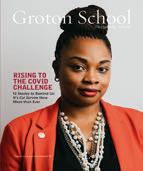
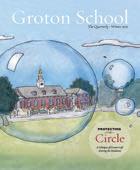
6 Groton School Quarterly Winter 2023
Members of Groton’s Debating Society. Bottom from left, Mimi Kovriga ‘24, Leah-Felicity Bay ‘27, and Lena Aloise ‘27. Top from left, Alisa Gulyansky ‘24, Amy Ma ‘23, Rowen Hildreth ‘23, Arjun Ray ‘24, and Husayn Ladha ‘24.
STUDENTS TO RESUME GLOBAL TRAVEL: GROTON GEOS (GLOBAL EDUCATION
OPPORTUNITIES)
ARE BACK
Groton celebrated Global Education Day on November 7 with an assembly that welcomed back Global Education Opportunities (GEOs) after a three-year pandemic hiatus.
During a morning presentation in the Campbell Performing Arts Center (CPAC), faculty members introduced the global GEOs they will lead this year to India, Indonesia, Japan, and Peru.
Theater and Dance Department Head Laurie Sales brought the colors of Bali to the CPAC, explaining that the GEO to Indonesia over spring vacation will immerse students in nature, spiritualism, and the arts. Students will attend the festive celebration of Nyepi; spend time at Green School Bali, which focuses on social entrepreneurship and sustainability; study the Indonesian language; hike Mount Batur; and study traditional Indonesian art forms, such as mask-carving and Balinese dance. Ms. Sales, who has lived in Indonesia, will lead the trip with science teacher Paula Marks and technical director Brandt Belknap.
Next, history teacher Tommy Lamont turned attention to the spring GEO in India, explaining that the country is the world’s largest democracy and fifth largest economy.
The India GEO will include travel to Delhi and various historic sites as well as several days at the Doon (for boys) and Welham (for girls) schools in Dehradun. The trip also will include a hike in the Himalayas, introduction to the clothing of India, and food, food, food. Ms. Lamont, who spent five months of a Groton sabbatical year in India, will co-lead the trip with World Languages and Cultural Department Head Rebecca Stanton and science teacher Claire Hawkins.
The globe then took a spin to South America for a presentation about one of Groton’s longest running GEOs, to Peru. Spanish teachers and native Peruvians Fanny Vera de Viacava and Luis Viacava will once again lead the GEO. The language and cultural immersion takes students to the Sacred Valley of Peru, where they stay with families in Ollantaytambo, which is considered the last living Incan town. Afternoon activities include teaching young children artwork, music, dance, and sports. Those on the Peruvian GEO, which spans several weeks during
STUDENTS EXCEL IN MUSIC COMPETITION
Nine Groton musicians have earned a place in the Massachusetts Music Educators Central Districts Music Festival, including six who were invited to audition for the All-State festival.
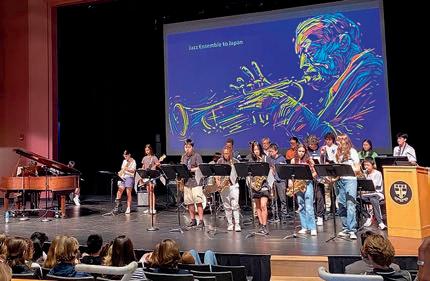
Winning a spot in Districts were Liv Ding ‘26 on viola; Alexander Newman ‘25 on clarinet; Amanda Chang ‘26 on flute; Eric Ge ‘24, Georgia Martin ‘24, and Matt Sennelius ‘25 on violin; Brittany Deng ‘24 and Julie Xie ‘23 on cello; and Brenda Li ‘25, a soprano, in the voice category.
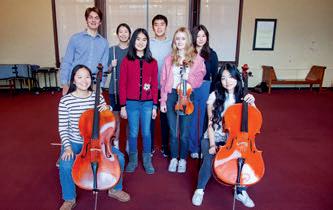
Liv, Alexander, Amanda, Eric, Georgia, and Brittany will also audition for AllStates. Liv and Alexander earned the
highest scores on their respective instruments and will be seated as principal players in the Districts orchestra.
“I am very proud of these nine Groton musicians, who put in the extra time and effort on top of their studies, Groton musical commitments, sports, drama, and other afternoon commitments to prepare for auditions for the Massachusetts Music Educators Central District auditions,” said Music Department Head Mary Ann Lanier. “Every year a few students from Groton audition, and we consistently send players to the festival and to AllState auditions. But this is by far our most resounding success!”
the summer, also visit Machu Picchu, and the Incan capital of Cusco.
Finally students imagined themselves in Japan, as Music Department Head Mary Ann Lanier and Jazz Ensemble Director (and Japanese native) Kenji Kikuchi described Groton’s summer music GEO, which begins in Tokyo’s diverse jazz scene and includes visits to Hiroshima, Kyoto, Osaka, and Miyajima Island. Students will attend performances and perform themselves on this cultural immersion through music.
The Global Education Day presentation ended with a performance by Soul Sauce, Groton’s jazz ensemble.
“I am delighted that we can travel on international GEOs again,” said Dean of Globalism and Experiential Learning Nishad Das. “Our GEO leaders did such a terrific job bringing to life the GEO destinations that within a few days of this event students had signed up in large numbers to participate in our GEOs.”
Groton’s GEOs are accessible to all students, and generous financial aid is provided.
CIRCITER www.groton.org 7
Groton’s Jazz Ensemble performs during the Global Education Day assembly on November 7, 2022.
Groton student musicians from left, Julie Xie ‘23, Alexander Newman ‘25, Amanda Chang ‘26, Liv Ding ‘26, Eric Ge ‘24, Georgia Martin ‘24, Brenda Li ‘25, and Brittany Deng ‘24.
Christopher Temerson
PARENTS FROM NEAR AND FAR VISIT GROTON FOR PARENTS WEEKEND
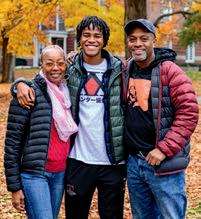
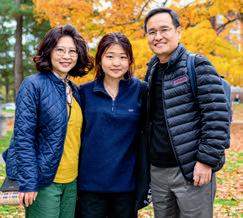
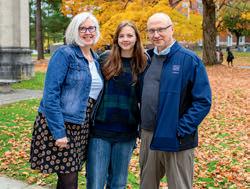
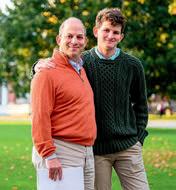
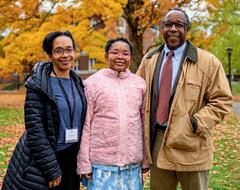
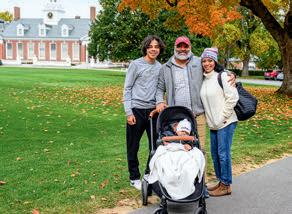
Groton School welcomed nearly 350 families to the Circle October 21–23 for a Parents Weekend filled with parent-faculty conferences, student performances, receptions, athletic games, and a variety of other activities all against the backdrop of a Circle dressed in beautiful, autumnal colors.
One highlight of every Parents Weekend is the headmaster’s address, which this year brimmed with gratitude as well as reflection on the impact of the pandemic. “How has the pandemic affected or changed your wonderful children?” Headmaster Temba Maqubela asked.
His answer was simple and clear: “They are better people.”
Mr. Maqubela said he has observed that students take less for granted and express gratitude for privileges large and small. “They look us in the eye when our paths cross they remember to say ‘thank you’ before saying ‘please.’” Routine privileges, which were on hold earlier in the pandemic, now spark comments of appreciation. “Having Surprise Holiday having Parlor in the Headmaster’s House, singing in Chapel our beloved students have been wonderful,” he said.
Families traveled to Groton from all over the globe and spent a significant part of the weekend meeting with their children’s teachers and advisors. Nearly 2,400 faculty-parent
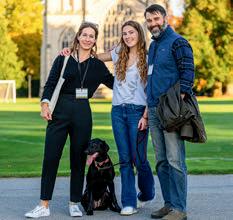
conferences took place over the weekend, excluding 118 scheduled virtually for families who were unable to attend in person about half the number of virtual conferences that occurred last year.
The weekend also included presentations on counseling, college counseling, spiritual life, and Global Education Opportunities; a luncheon for international families; and a Parents Weekend concert showcasing the instrumental, vocal, and dance talents of Groton students.
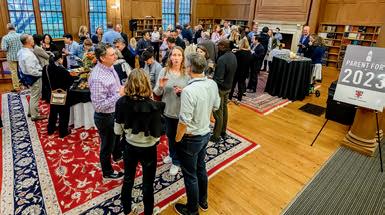
The most important activity doesn’t change from year to year: downtime for parents and children together.
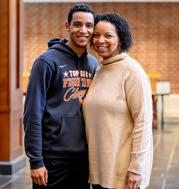
8 Groton School Quarterly Winter 2023
Adam Richins
MS. FRIEDMAN’S impact on the Circle Voice extends much further than her contributions to the newspaper’s reputation. Her true legacy lies in her unwavering dedication to mentorship, uplifting writers to find their voice and gain confidence in their abilities. Ms. Friedman took a keen interest in the Circle Voice beyond the pen and paper as she formed meaningful bonds with writers and editors.
As editors-in-chief, Joon (Whang ’23) and I initially stumbled a bit while trying to find our footing. We spent many early mornings perfecting the newspaper’s layout up until the last minute and often felt burdened by budgetary constraints. However, Ms. Friedman always trusted our leadership. She helped me grow by honing my management skills and inspiring my journalistic endeavors. It was a privilege to work alongside Ms. Friedman during her final year on the Circle.
Sophia Bay ’23
THE FIRST rule Ms. Friedman taught me was to refrain from using the word “incredible.” It was a rule that stuck, like many of her other lessons: limit white space on the page, ensure a balanced reporting of sources, and keep language lean. But this rule of refraining from the word “incredible” stuck with me the best because it was a lesson on being clear and purposeful. In modern language, the majority of words either shroud meaning or add fluff. Journalism taught
Thank you, Ms. Friedman
Gail Friedman, Groton’s former director of communications and marketing, departed the Circle in December 2022 for the West Coast, where she is now the chief communications officer at Brentwood School in Los Angeles. During her more than eleven years on the Circle, Ms. Friedman masterfully led Groton’s communications and marketing efforts, artfully conveying how the school evolves and responds to opportunities and challenges while honoring sacred traditions. In her role, Ms. Friedman served as editor of the Quarterly, dorm affiliate, student advisor, and advisor to the Circle Voice, Groton’s student newspaper. Several current and former Circle Voice editors shared these memories of their experience working with Ms. Friedman.
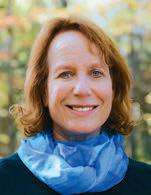
me how to buck that habit, and how to faithfully communicate our human stories onto newsprint Ms. Friedman helped me realize that lesson.
Joon Whang ’23
MS. FRIEDMAN was more than just a teacher in charge of the newspaper. She was a mentor and a true inspiration to everyone who had the privilege of working with her. Under Ms. Friedman’s leadership, the Circle Voice flourished and became a respected publication both within the school and beyond. Ms. Friedman’s impact on the Groton School community will be felt for years to come, and her legacy as a teacher and mentor for the CV will continue to inspire future generations of journalists.
Tyler Weisberg ’22
ON THE mornings I needed to finish laying out the Circle Voice early before Chapel, I remember sleepily stumbling into the ground floor of the Schoolhouse. I didn’t have my own set of keys to the newspaper’s office, so I’d have to meet Gail there. Every time, no matter how grumpy or exhausted I was, she’d let me in with a smile. In many ways, as the newspaper advisor and dorm affiliate, Gail was one of my mentors at Groton, and I’m grateful to her for the early mornings and the late nights and, above all, the space to learn to love writing and leading. I wish her all the best at the Brentwood School.
Cara Chang ’20
THROUGHOUT MY time at the CV, Ms. Friedman pushed us to produce the best work we could while providing lots of guidance and encouragement. Through her, I learned about how to be a better journalist, but also came away with skills that still apply to my daily life, like setting high standards and communicating effectively. She was definitely an important part of my time at Groton, and I’m sure she will be missed on the Circle!
Marianne Lu ’19
IT WAS great to work with Ms. Friedman and to learn about crafting effective communication across multiple platforms. I wish her the best of luck in Los Angeles.
Ben Calmas ’18
MS. FRIEDMAN was the very first person to give me the confidence to lead. Being editorin-chief of the Circle Voice with Varsha Harish was an incredibly important part of my personal growth at Groton, and I will always remember Ms. Friedman’s steady support throughout my tenure. She gave Varsha and me generous latitude throughout our time, even letting us manage relationships with our external vendors a very meaningful show of trust as two teenagers who were just trying to do their best and get into college. Ms. Friedman only intervened when we were truly on a collision course with disaster, and it was her light touch guidance that really allowed me to trust myself
and develop as a leader. It’s been seven years since I left the Circle I’ve certainly felt Ms. Friedman’s influence over that time. I was extraordinarily lucky to learn from her outside of the classroom, and I’m so excited for Brentwood to benefit from her wisdom and savvy.
Ethan Woo ’16
AS YOUNG , eager student journalists often are, I remember that we were often keen to push the boundaries whether it was seeing just how close to the print deadline we could get before submitting our final copies, trying to publish what we saw as damning exposes of this and that, or whatever the humor section got up to.
Gail was ever-patient in nudging us along the right path and redirecting our energies into properly learning the craft of journalism and why it was so important. She impressed upon us the responsibility of being Groton’s paper of record: That an uninformed campus would be a poorer one. That our readers deserved to know what was happening in the place where they lived, studied, and worked. That a newspaper’s work really matters.
Gail’s mentorship helped inspire me to go on to pursue journalism in college at the Harvard Crimson, and develop a lifelong love for the press. (The periodic staff retreats to her house for home-baked snacks certainly didn’t hurt either!)
Derek Xiao ’15
CIRCITER www.groton.org 9
LESSONS & CAROLS
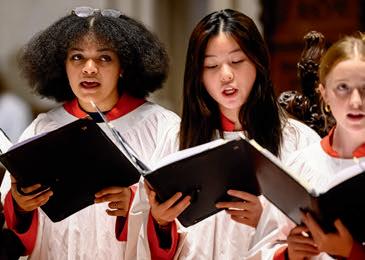
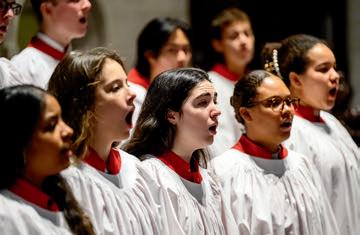

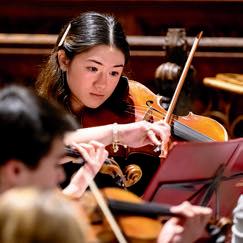
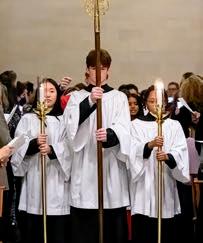
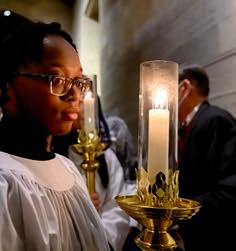
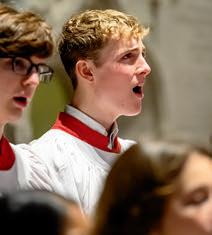
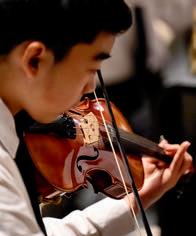
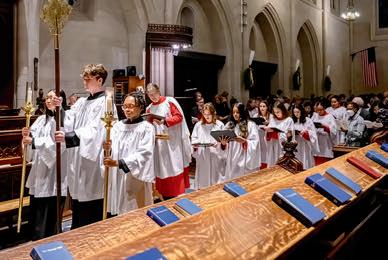
10 Groton School Quarterly Winter 2023
Joy on the Circle and Around the World
Adam Richins
St. John’s Chapel filled with joy, reverence, and ethereal song on December 15 as Groton’s favorite Christmas tradition the Festival of Nine Lessons & Carols embraced students, faculty, and staff in the spirit of Christmas.
The Reverend Allison Read, Groton School’s chaplain, presided at each service, which began after a prelude by the Groton School Chamber Orchestra, directed by Tim Terranella.
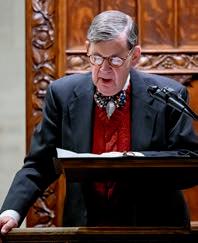
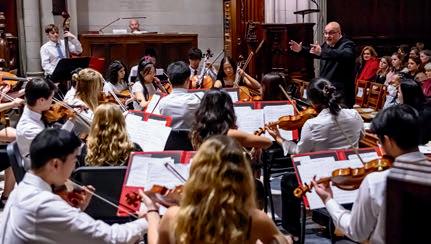
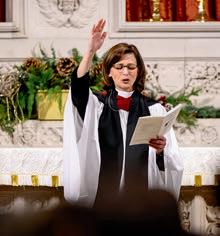
An English tradition practiced at Groton School since 1928, Lessons & Carols is so beloved that hundreds tune in to a livestream each year to hear the Christmas readings and the choir’s beautiful carols and hymns. For about ninety minutes, the service slows down the world and encourages reflection on the meaning of Christmas.
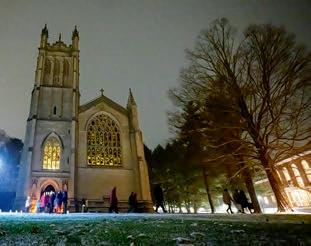
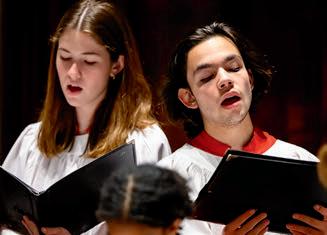
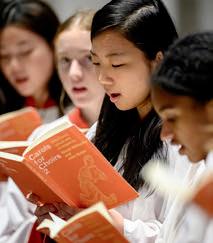
Once again this year (the first time since pre-pandemic), the school presented
three Lessons & Carols services: the first, on December 9, was a public service primarily for our neighbors in the town of Groton, while the second, on December 11, welcomed parents and alumni. The final service, for those who live and work on the Circle, is always the most anticipated, for its beauty as well as the fact that it heralds the start of winter vacation.
Groton’s choir, under the guidance of Choirmaster and Organist Daniel Moriarty, sang traditional hymns and carols, while honorees shared the nine religious readings the lessons. Among the readers on Thursday night were Headmaster Temba Maqubela; Bill Polk, Groton’s sixth headmaster; College Office Administrator Ryan O’Donnell; and several students, including four form officers, a senior prefect, and a Chapel prefect. Soloists on Thursday included Amelia Barnum ’24, Oliver El
Hadj ’24, Afrika Gaye ’24, Ebunoluwa Lawore ’24, Maya Luthi ’23, William Vrattos ’23, and Elizabeth Wolfram ’23. At the December 9 service, soloists were Christina Chen ‘23, Anders Caspersen ‘25, and Samuel Winkler ‘23, as well as Elizabeth, Amelia, Maya, and Ebunoluwa. Soloists on December 11 were Ava Bridges ‘24, Afrika, Oliver, William, Amelia, Ebunoluwa, and Anders.
Readers at the December 9 public service included several members of the nearby community, including Groton Chief of Police Michael Luth; the chair of the town’s Diversity Task Force, Raquel Majeski; Robert Pine, a trustee of the Groton Conservation Trust; the Reverend Sean Maher of the St. J’s Collaborative of Our Lady of Grace and Saint John the Evangelist Roman Catholic Parishes; and Lawrence Academy Head of School Daniel Scheibe.
For more than 90 years, the traditional Lessons & Carols service has amplified anticipation of Groton’s holiday season and close of winter term. It was inspired by the original 1918 Nine Lessons & Carols service at King’s College in Cambridge, England, which sought to spark the holiday spirit and spread peace in the midst of war-stricken Europe.
www.groton.org 11
CIRCITER
Feliz ’99 Healing Housing
Allen
Though Allen Feliz ‘99 never lived in public housing, his mother lived close to them when she first emigrated from the Dominican Republic to New York City. Allen heard her stories about the South Bronx projects, notoriously rundown, unsafe, and riddled with neglect and underinvestment. And the stories fueled his conviction that affordable housing didn’t have to be that way.
“I think a lot about what she went through, what her siblings went through moving their families to the U.S., or starting their families in the U.S.,” Allen says. “It was a lot of hardship, a lot of struggle.”
The other side of the struggle was a rich history of community activism that sprouted inside the projects, and fueled Allen to get involved in the viability of the housing developments themselves. He often watched vital projects launch with much fanfare, then deteriorate due to mismanagement or lack of resources.
This created a need, and an opportunity. In 2009, Allen co-founded a consulting firm, Tax Credit Asset Management (TCAM), to provide organizational consulting and asset management to the institutions running the developments: municipal housing authorities, state housing
finance agencies, for-profit and nonprofit local housing owners, and low-income housing tax credit program asset investors.
“TCAM started with the idea that we’re going to help you be good stewards of these properties for decades,” Allen says, “so they’re sustainable financially, and so that you’re providing quality housing to folks for a long time.”
The notion of seeing a need and stepping up to fill it is something he traces back to chapel talks with thenheadmaster William Polk ’58 “There’s definitely this ethos at Groton of ‘Go out there and do something interesting and make a difference.’ It was about being a part of something that’s bigger than yourself,” Allen says. “Leaving Groton, I wasn’t sure exactly what I was going to do, but I was going to help people and help my community.”
Allen earned top grades throughout middle school in the Bronx and was chosen for the prestigious Albert G. Oliver Scholar Program, a pipeline to connect students from under-resourced schools with independent schools and scholarships.
“I wasn’t so sure Groton was a good fit,” Allen recalls. “But then I visited, I fell in love, and I said this is where I need to go.”
History teacher and football coach John Lyons was particularly influential to Allen, who was a lineman all four years and served as spiritual leader of the football team as a senior. Lyons had an inclusive way of connecting everyone to what he was teaching, Allen says, even for students of color or female students “whose ancestors obviously had a different role, historically speaking.” Allen stayed in touch with Lyons, who attended his wedding in 2019.
“I probably wouldn’t be doing what I do now, and I probably wouldn’t be that interested in politics and service had it not been for John Lyons’ history courses,” he says.
Allen attended Brown University as a political science major, and later Syracuse University, where he earned a master’s in public administration. He started his career financing the construction and rehabilitation of affordable housing with Boston Financial (then called MMA Financial), where he helped structure public-private
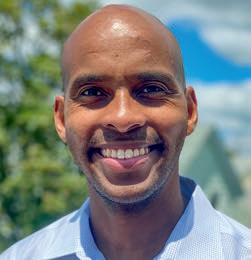
12 Groton School Quarterly Winter 2023
partnerships between local housing developers and bank investors for apartments supported by federal lowincome housing tax credits. That role gave him a critical foundation for understanding the affordable housing landscape.

As managing director at TCAM, he spent ten years helping housing authorities oversee regulatory compliance and financial health for their housing projects. For example, in the District of Columbia, TCAM helps ensure repayment of more than 8,000 loans that finance thousands of housing projects.
“That sounds like a simple task, but because these loans are complex— frequency and amounts of repayments vary by loan and require complex calculations—and the portfolios are large, many housing agencies lack the manpower and knowledge to do this well,” Allen says.
TCAM was acquired by MRI, a real estate software company, in 2019.
These days, Allen leads MRI’s division responsible for providing software and services to providers of affordable and public housing throughout the U.S. He also is on the board of several affordable housing trade or advocacy groups, including the Urban Land Institute’s Affordable/Workforce Housing Product Council and the National Public Housing Museum. “Whether I’m representing MRI or working with industry leaders,” he says, “I’m generally evangelizing for the provision of new and preservation of existing affordable housing in the U.S.”
Allen’s passion for political campaigns runs on a track parallel to housing. He has volunteered in every presidential election since 2004, including door-knocks for Hillary Clinton in Ohio in 2016 and phone banks for Joe Biden in 2020. Both times, he was struck by another need: the importance of generating a wider political engagement in some
communities and encouraging people to exercise their right to vote.
To that end, Allen co-founded the voting rights organization One Nation Every Vote, or OneV, which provides information about candidates and issues to inspire citizens to engage with the political process, and to vote.
Allen says he can track Groton’s influence throughout his political journey. During Barack Obama’s reelection campaign in 2012, he regularly carpooled from Boston to New Hampshire with former Groton formmates to knock on doors and urge voter turnout. Jake de Grazia ’99—who also attended Brown with Allen—led a support and activism group he called “the political huddle” with about a dozen Groton and Brown alumni. The huddle inspired the formation of OneV.
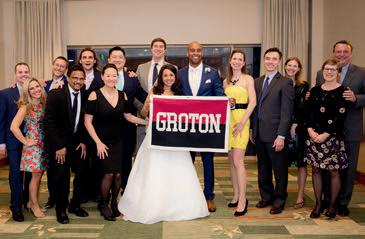
“I’m a product of a lot of people’s generosity,” Allen says with fondness, “and of great communities.”
— Jennifer Bonniwell
www.groton.org 13 PERSONAE
Allen’s 2019 wedding was a veritable reunion. From left: Justin Conroy ‘99 and his wife Katie Stone Conroy, Alston Ramsay ‘99, John DantzlerWolfe ‘99 and his wife Andrea Lee (beside him), Jake de Grazia ‘99, Noh-Joon A. Choo ‘99, Ben M. Niles ‘02, Sandra E. Feliz, Allen Feliz ‘99, Kristen (Heudorfer) Craft ‘99, Matt Hession ‘99 and his wife Becky Hession, Hannah Felton Lyons, and Groton history teacher and football coach John Lyons. (Photo provided by Allen Feliz)
»
“Whether I’m representing MRI or working with industry leaders,” says Allen, “I’m generally evangelizing for the provision of new and preservation of existing affordable housing in the U.S.”
Lynn Cunningham ’79 Therapeutic Intentions
started to see a pattern emerge: a large number of people prescribed psychiatric medication for relatively benign stress or unhappiness, and the emergence of side effects requiring more and more medications, resulting in powerful and disabling drug cocktails.
Before having children, she had worked in film, and felt the familiar stirrings of an untold story. And she began to compile a team to tell it.
When Lynn Cunningham ’79 began researching the detrimental effects of psychiatric drugs, it wasn’t to make a documentary. She was trying to make sense of what had happened to a beloved relative.
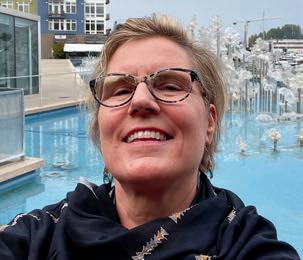
“She’d been a star athlete and a scholar before she experienced mental health struggles in her early twenties. One diagnosis led to another, and a medical avalanche of prescriptions followed,” Lynn recalls. “Ten years later, after two suicide attempts, she was taking ten medications daily and on disability. And I started wondering whether all these medications could be contributing to her dysfunctionality.”
Lynn read “everything she could get her hands on,” then began interviewing doctors, scientists, and patients. She found that hardly any long-term studies exist tracking drug effects and interactions over time. She learned about a concerning lack of informed consent within psychiatry; patients weren’t being adequately or accurately informed about the risk of serious side effects, including the potential for long-term harm. And she learned about the difficulty many people experience trying to wean off the drugs, particularly benzodiazepines and antidepressants. Lynn
The documentary Medicating Normal follows the journeys of a newly married couple, a female combat veteran, a waitress, and a teenager whose doctors prescribed psychiatric drugs for stress, mild depression, sleeplessness, focus, and trauma. They struggled with serious physical and mental side effects from taking the drugs as prescribed, and then also struggled with trying to withdraw from the drugs. Psychiatrists and scientific experts Lynn interviewed told her repeatedly that for the one in five Americans taking these drugs, debilitating side-effects are common, yet not commonly acknowledged.
Medicating Normal aired on PBS in 2020, and has been screened at more than twenty film festivals and won seven awards, including the Humanitarian Concerns Award from the International Society for Ethical Psychology and Psychiatry. The film streams on Amazon Prime and other platforms, and has sparked a public dialogue on the overprescription of psychiatric drugs, their safety and efficacy, and their long-term impact on health and wellness. And what began as a mission to help a family member became a probe of our psychiatric standard of care.
Lynn always loved visual storytelling. At Groton, her senior project with Mr. Parker entailed documenting life around the Circle for the Admissions Department using handmade black and white slides. She also loved history

14 Groton School Quarterly Winter 2023
classes with Ms. Holden and with Mr. Dilworth, and critical thinking and logic with Mr. Gula—all of which, combined, created a great basis for research and storytelling. “It was a superb, superb education,” she says.
Initially, filmmaking wasn’t on her radar. She majored in architecture at Yale, but was always drawn to the visual arts. Her first job was in advertising at a firm in New York. “I loved all the creativity,” she recalls, “but it just wasn’t deep enough.”
NYU offered a continuing education course in filmmaking, and she learned the ropes in 16mm film, which is much less accessible than today’s digital laptop editing. She took a job as an assistant editor at New York City’s Middlemarch Films (first known in 1975 for Grey Gardens, the documentary about the eccentric Bouviers living in squalor in the Hamptons), and began editing programs for PBS and the History Channel. In 1991, Lynn traveled to Japan on a grant to study creativity in Asian cultures, resulting in an exposé about children who refuse to attend school that won
the Japan Times Award. After she returned from Japan, she married Court Cunningham ’86, and had two sons, and was a full-time parent while juggling projects on the side. One project was in fact for Groton; her class was the third form to graduate after the school became coeducational in 1977, and the school asked if Lynn and her Groton roommate, Amy Cunningham ’79 (who’d later become her sister-in-law), would make a film to mark Groton’s twentyyear anniversary of co-education. Back home, her family member’s psychiatric struggle grew, and she was motivated by a desire to understand more about the many drugs she was taking. “I wasn’t looking to get back into filmmaking. I wanted to help her,” Lynn says. “And then when I started learning what I did, I knew I had to make a film.”
There’s a moment in Medicating Normal when Angie, a combat veteran recovering from the disabling effects of polypharmacy (having been prescribed more than seventeen drugs over a ten-year period), has a potent
insight: When she first sought help, she wasn’t sick, she was sad. And perhaps it’s not necessary to medicate sad.
“We were witnessing the creation of psychiatric patients among people experiencing a normal range of human discomfort—sorrow, anguish, stress. It’s the medicalization of normal human emotions,” says Lynn, who notes that our psychiatric system of care uses drugs as the first line of treatment, resulting in overprescription. This is especially true of the more vulnerable members of our population—children, veterans, the elderly, youth in foster care, etc.
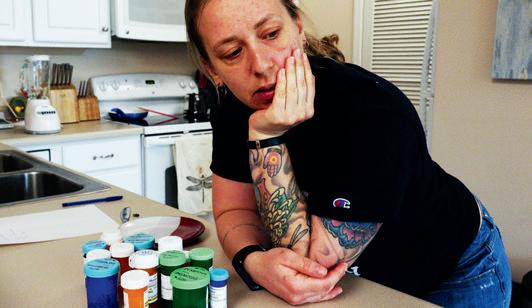
“Which is not to say that people don’t go through tremendous pain and suffering,” she hastens to add, and that some are helped by medication. This only underscores the importance of making sure people are fully aware of the possible repercussions of taking, and multiplying, medications in the long run. “When it results in drug dependency and dysfunction, the solution can be worse than the problem.”
— Nichole Bernier
www.groton.org 15
»
She had a potent insight: When she first sought help, she wasn’t sick, she was sad. And perhaps it’s not necessary to medicate sad.
PERSONAE
Angie, one of the people profiled in Medicating Normal, is a veteran whose psychiatric prescriptions multiplied to combat the growing side effects.
THE OF A CHARACTER
Bill Camp’s roles in award-winning films and plays reflect more than scene-stealing talent. They show years of development under gruff-love tutelage at Groton.
 by David Saltonstall ’82
by David Saltonstall ’82
On a dimly lit set in Berlin, one that might pass for the subterranean cellars of Hundred House, Bill Camp ’82 sounds every bit the Rector as he says to his young co-star, “What do you want child? You should be in chapel!”
He is Shaibel, the basement-lurking janitor and gruff chess mentor in The Queen’s Gambit Bill’s performance in the 2020 Netflix series is one of many recent standouts for this former Groton faculty kid. The Boston Globe has called him “awe-inspiring,” and the New York Times, “an everyman, with a face and physique that would fit on a barstool in any workingman’s bar in America.” He may not have the name recognition of a Daniel Day-Lewis or Matt Damon (both leading men he has appeared alongside). Instead, he has become what many regard as Hollywood’s most valuable supporting actor—the side character who quietly yet spectacularly steals every scene he graces, seemingly without effort.

It is a talent and a persona that has brought Bill to a curious, high-low space in today’s cultural stratosphere, where his star burns almost incandescently on the radar of those who genuinely care about the craft of acting—critics, fellow actors, playwrights, directors—even if for now the Hollywood star-making machine has decided he is not quite leading man material.
“I think there are no better actors alive today than Bill Camp,” says playwright Tony Kushner. Kushner is a giant of the American theater—a Pulitzer Prize and Tony Award winner for Angels in America, a two-time Oscar nominee, and a recipient of the National Medal of Arts. But on this winter day at his home in New York City, Kushner is talking about Bill— whom he has worked with on several projects, including the 2012 Oscar-nominated Lincoln in a way that suggests it is Camp who deserves a shelf full of accolades. “I think he is really one of our greatest actors, and I would go see him
www.groton.org 17
In the Netflix series The Queen’s Gambit, Bill Camp plays a janitor at Beth Harmon’s orphanage, introducing her to the game of chess and mentoring the young prodigy she will become.
do absolutely anything. I am in awe of him.”
Bill is the real thing, Kushner adds, and a study in minimalism. “It is not showy, it is not a matter of watching tons of complicated tics or gestures. There is just a sense of somebody who has dug as deep as one can into the heart of a character, and it is thrilling to watch. If Bill were a British actor, he would be Sir William Camp, and much would be made of him.”
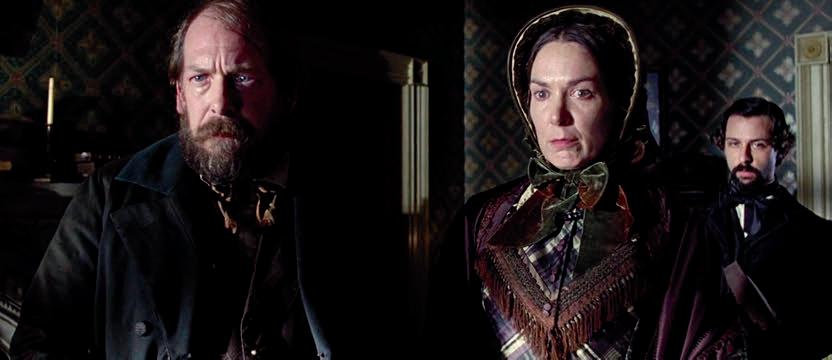
What is also true is that unlike his screen roles, Bill’s Broadway and OffBroadway stage credits include some of the largest, most complex characters ever conjured by the theater. They include lead roles in Shakespeare’s Macbeth and Henry V, James Tyrone in Long Day’s Journey Into Night (2022), Charley in Death of a Salesman, Alceste in Moliere’s The Misanthrope, and a murderer’s row of other great dramatic heroes, villains, and misfits. On stage, he is every bit the top dog.
“In a real civilization, he would be everybody’s first for leading man,” Kushner says, “because he can carry a production.”
SITTING IN AN UPPER WEST
SIDE DINER over a plate of eggs and sausage, Bill is supremely uninterested in giving the arc of his career much thought, much less any attempt to define his Hollywood persona. He is a few days away from a deep-sea fishing trip to Panama with his wife, the equally revered actress Elizabeth Marvel, and their sixteen-year-old son, Silas (who, as it turns out, would catch and release a 450-pound marlin). Bill described his approach to building his career much like throwing a hook into the ocean and waiting for the next interesting fish to come along.
“I’m amazed every day of my life at how it happened, because it wasn’t planned in any way,” he says. “Stuff comes … And good work begets work, begets work, begets work. And then I just sort of see what happens. I am just enjoying the ride.”
And it’s been a helluva ride. To list all of his credits to date would take up an entire Quarterly. Just Google him. You’ll find more than twenty major Broadway and Off-Broadway
18 Groton School Quarterly Winter 2023
“IT IS NOT SHOWY. THERE IS JUST A SENSE OF SOMEBODY WHO HAS DUG AS DEEP AS ONE CAN INTO THE HEART OF A CHARACTER, AND IT IS THRILLING TO WATCH.”
Top left: Lincoln (with wife Elizabeth Marvel), 20th Century Fox. Right from top: The Night Of, HBO. Birdman, Fox Searchlight Pictures. Dark Waters, Focus Features. The Looming Tower, Hulu.
productions, plus seventy-seven film and TV credits on his IMDb profile, including a celebrated turn as NYPD Det. Dennis Box in The Night Of that earned him a Primetime Emmy Award nomination.
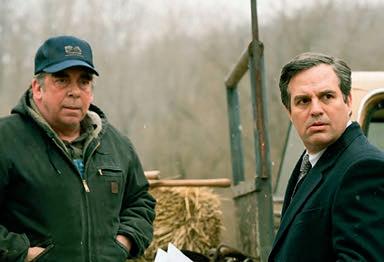
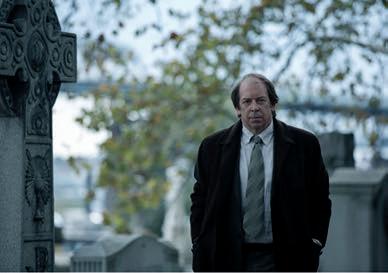

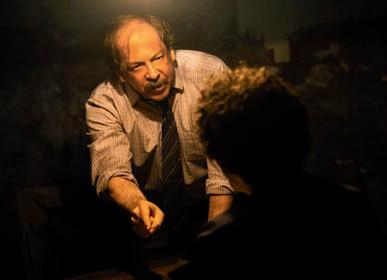
You will also find this remarkable factoid: Bill has appeared in five movies nominated for Best Picture of the Year by the Academy Awards. They include Lincoln (2012), Twelve Years a Slave (2013), Birdman (2014), Vice (2018), and Joker (2019). There is a tiny sub-set of other actors in all of Oscar history who can say they’ve appeared in five Best Picture–nominated films, but their names are somewhat more known than Bill’s. Names like Paul Newman, Anthony Hopkins, Diane Keaton, Geoffrey Rush, Richard Burton, Willem Dafoe, Emma Thompson, and Christian Bale.
Pretty good company for a kid whose break-out role at Groton School was Giles Corey in a 1982 production of Arthur Miller’s The Crucible—a play that, in an astonishing bit of full Circle-ness, he would reprise decades later on Broadway with a performance as Rev. John Hale that would earn him both Tony and Drama Desk award nominations.
For all the acclaim, though, Bill says he wears his craft—and his approach to each character—about as loosely as Shaibel’s old cardigan. He is more in-themoment, less method, when it comes to work.
“If I become too conscious about, ‘Oh, how am I going to do this?’ then I’m no longer there. Does that make sense? If I start to edit myself, then I don’t have both feet in and I think the audience feels that.”
To say that Bill took a circuitous route to his current spot in the Hollywood and Broadway pantheon would be an understatement. It includes a midcareer stretch when he walked away from acting entirely at age thirty-six, with little intention of returning. But the journey
19
started in elementary school. Bill grew up in Groton, which made him immediately wiser and more knowing than the rest of us as to the ways of the school in the late seventies and early eighties. Bill’s father was the late Peter Camp, a beloved teacher (mostly English) and coach (mostly cross-country skiing, some baseball) to twenty-five years of Groton students. The senior Camp also served as acting headmaster from 1977–1978, after the death of Rowland Cox from cancer in 1977 and before Bill Polk took the reins. Bill’s mom, Pat, was a school librarian. When Bill arrived as a student in 1977, it was still a tumultuous time for Groton, having weathered a series of halting leadership changes after the departure of the Rev. John Crocker in 1965. Co-education was new (Bill’s older sister, Catie Camp, became the school’s first female grad ever in 1977, when her dad handed her the diploma), and the school was trying to find its way in a rapidly changing society. But in many respects, it was still a bastion of old-school New York and New England privilege.

As an elementary school student, Bill had gotten involved in the nowdefunct Groton Children’s Theater, an ambitious program run by a local teacher named Michael Deneault, who staged everything from Godspell to Free to Be … You and Me (yes, it was the seventies). Other troupe members included a healthy number of students who would become Form of ’82 classmates: Anita “Nina” Rogerson Morris, Virginia Rhoads, Mark Roberts, Liz Bolger Deneault was also Bill’s fourth grade teacher, and someone he credits with igniting his creativity. “He sort of presented the landscape for me. And he encouraged the use of the imagination that we all have as kids, especially in fourth grade. Instead of stifling that or suppressing that, he really stoked it and nurtured it.”
Today, Deneault is seventy-five years old and long retired from teaching, but he remembers Bill distinctly. He laughs as he recalls the time when eleven-year-old Bill played Scrooge
in A Christmas Carol and stayed in character during the curtain call, wishing everyone in the audience a very merry Christmas. “When he did that, I thought to myself, ‘That kid is going places.’ ”
There was a unique sparkle in his eye, Deneault recalls. “I hate the word ‘maturity,’ but there was a maturity with which he approached what he was doing. He really found insights into Scrooge or whatever role he was playing. And that’s what teachers get paid in—you don’t get money for your job, but if you’re lucky, you get a kind of instant satisfaction that comes when you see a student shine.”
When he arrived at Groton in Second Form, Bill was quickly drafted to anchor a short bit performed on Parents Weekend that featured him as an orchestra conductor who transforms from a stuffy maestro into a rockin’ bandleader, to the strains of Diana Ross & the Supremes. The piece was the brainchild of then–English Department chair Michael Mitchell, who would go on to be the artistic director of the Phoenix Theater in Arizona and the Fulton Theater in Lancaster, Pennsylvania. “He was a brilliant guy with a real sense of stagecraft,” Bill says of Mitchell, who died of cancer in 2008.
But there would be no more acting at Groton until Bill’s Sixth Form year. Much of his energy was redirected instead to playing soccer, hockey, and baseball (Bill still plays hockey regularly in New York as part of a nighttime men’s league at Chelsea Piers). In addition to his role as Rev. John Hale, some might remember his turn as Mick Jagger in that year’s talent show, in which he seemed to truly inhabit the young Mick.
His real dramatic triumph of the year, however, was a play called Tigers that Bill and fellow faculty kid Nini Rogerson staged as part of a senior tutorial that they performed in a dusty basement room in the Schoolhouse. They were a circus couple trapped in a terrible marriage and mourning the loss of a child, and the vulnerability that they brought to the roles was both
20 Groton School Quarterly Winter 2023
BILL DESCRIBED HIS APPROACH TO BUILDING HIS CAREER MUCH LIKE THROWING A HOOK INTO THE OCEAN AND WAITING FOR THE NEXT INTERESTING FISH TO COME ALONG.
Camp family
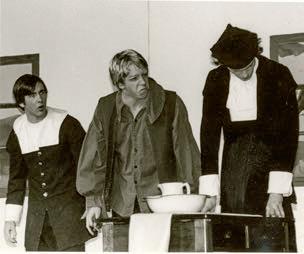
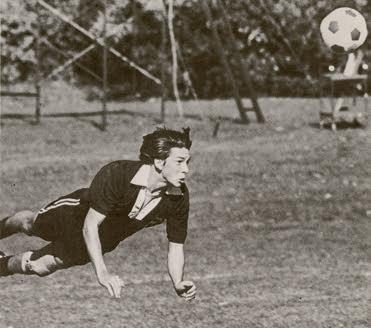
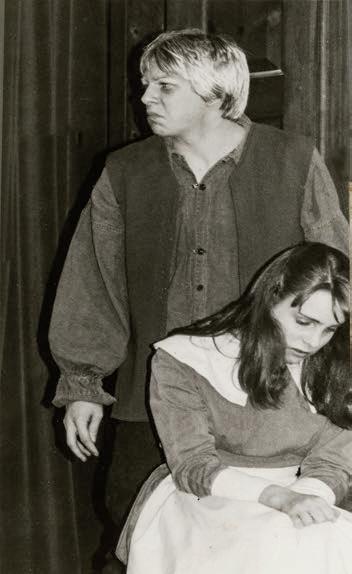
BILL GREW UP IN GROTON, WHICH MADE HIM IMMEDIATELY WISER AND MORE KNOWING THAN THE REST OF US AS TO THE WAYS OF THE SCHOOL IN THE LATE ’70S AND
www.groton.org 21
Bill Camp played soccer at Groton, as well as hockey and baseball. Onstage, his campus acting roles included Giles Corey in a 1982 production of Arthur Miller’s The Crucible. Decades later, his Broadway performance as Rev. John Hale in The Crucible would earn him both Tony and Drama Desk award nominations.
haunting and well beyond their years.
“I just remember standing with a lion-tamer’s whip and us arguing, having these big fights, and Nini getting very emotional,” says Bill of their roles. He also recalls a female faculty member weeping at the end of one show, so torn by the story and its telling. “That really stuck with me.”
There were other influences at Groton, including the towering Todd Jesdale, whose near-manic enthusiasm for William Shakespeare managed to make the Bard both more approachable and more intelligible for the uninitiated. That foundation would serve Bill well in the many Shakespeare roles he would later play, including a break-out 1993 performance as Prince Hal in Henry IV, Parts 1 & 2 at the American Repertory Theater (A.R.T.) in Cambridge, Massachusetts, as well as productions along the way of Twelfth Night, Henry V, Hamlet, and Troilus and Cressida “I often thought of Todd,” Bill says, “and how lucky I was to have that exposure.”
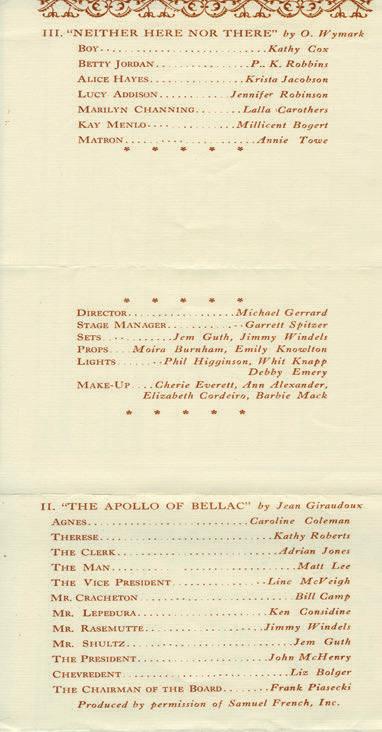
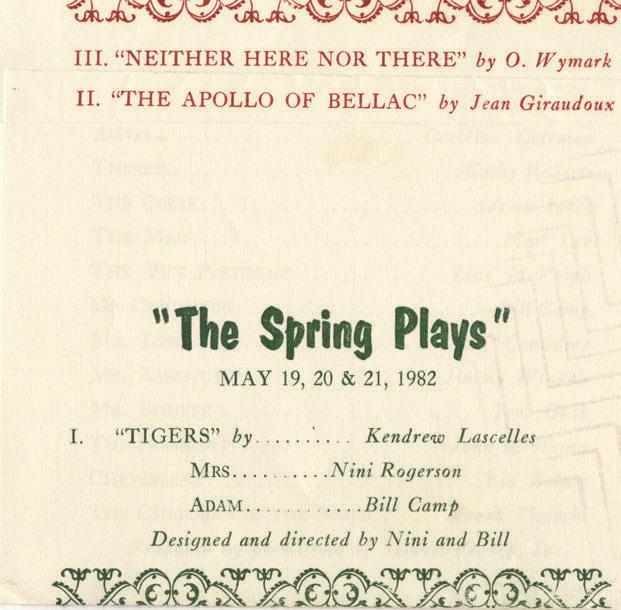
Looking back, Bill believes that his time at Groton—and the teachers he had there—probably helped him channel his inner Shaibel and the other, hard-shelled, soft-on-the-inside characters that have peppered his work. “There were people that we were all exposed to at Groton who had that quality—that kind of stoic, unrevealing, grumpy demeanor, but underneath had this amazing softness or compassion. They would do anything for you, because they wanted the best for you.”
TRY-OUTS FOR THE JUILLIARD SCHOOL ARE NOTORIOUSLY
BRUTAL, especially in drama. More than 1,500 applicants show up for what is traditionally about eighteen spaces, making for an acceptance rate that is multitudes harder than any Ivy League college. By the time Bill stepped up to
Bill Camp and Nini Rogerson starred in Tigers, an emotional play about an unhappily married circus couple mourning the loss of a child. He recalls looking across the audience at the end of the performance and seeing a faculty member weeping. “That really stuck with me.”
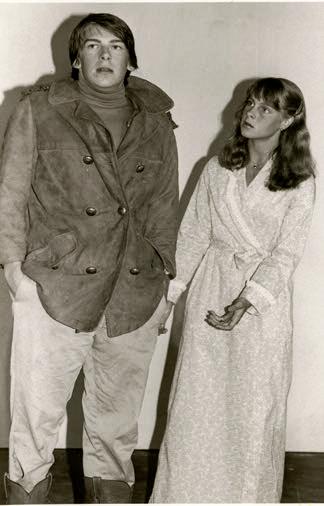
22 Groton School Quarterly Winter
audition in 1984, he had spent some years at the University of Vermont (“I was a Classics major and I was failing because I wasn’t going to class”), where he dabbled in college theater, mostly as a stagehand. He even got his IATSE union card. But then one day he saw a group of recent Juilliard grads preparing for a performance in the local theater, and was mesmerized.
“I thought, I’m going to find out how I can get into that place.”

He applied to Juilliard and a smattering of other programs. He remembers showing up at Lincoln Center with 400 other hopefuls and spending most of the day in a dank hallway. He performed two pieces—a bit from Catcher in the Rye, and a monologue by one of the clowns in The Tempest—and that was it. He was in.
What followed was ten-plus years of workaday acting as Bill honed his craft, tilling the fields of regional theater and landing the occasional movie or TV gig. It was hard, relentless, low-paying work. A bright spot in this grueling period was meeting Marvel, a fellow Juilliard alum whom Bill routinely refers to as his more interesting and talented half. They ended up in Los Angeles in the late 1990s, where she had a long-running gig on CBS’s The District
Bill had just finished up an acclaimed performance in New York as a heroin-addicted NGO in Kushner’s Homebody/Kabul—a prescient look into Afghanistan’s war-torn culture, crafted years before the 9/11 attacks—and tried his best to settle into Hollywood.
It didn’t work.
“I sat in L.A. and tried to live as an actor and very quickly was disillusioned by it all,” he recalls. “And then suddenly it was like, ‘Why am I doing this, really doing this?’ I didn’t have the same sort of motor or fuel that I had before.”
So Bill left acting, or maybe acting
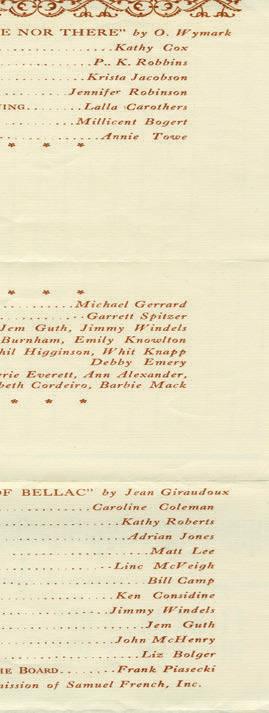
left him. He was thirty-six. He and Elizabeth stopped living together (they were not yet married) and he crawled off to Pasadena to try and find some perspective. He cooked, bussed tables, did some landscaping, even worked at a garage fixing cars for a bit. He also went “non-com” with anyone in show biz, except for Kushner and Robert Woodruff, then the artistic director of the A.R.T.
“I sort of lost it,” he says of his need to step away. “I was just so distracted by everything and had no idea who I was at all, because I had identified myself as Actor Guy and whatever that mask was, or for whom.”
It was Kushner, though, who ultimately pulled Bill back into the game when he asked if he would reprise his role as Quango Twistleton in Homebody/ Kabul as part of a new production.
“I am not sure now exactly what I said, although I am sure that I said what I have always felt,” said Kushner. “Being in the presence of a really great actor, doing something astonishing on stage, it opens up doors and windows to possibility and to the miraculousness and to the mysteriousness of the universe. You just feel like this person on stage is channeling something of enormous force and power, and there are very few people who can do it. I mean very, very few. And if you happen to be one of those people, it is hard to believe that you are going to retreat from it.”
ELIZABETH MARVEL REMEMBERS exactly where she was when she met Bill Camp for the first time— years, in fact, before Julliard. She was a fifteen-year-old boarding school student in northern Michigan in 1984 when Bill, then twenty, stopped through with some friends as they hitchhiked cross-country. “At the time, he had long brown hair and was like
www.groton.org 23
LOOKING BACK, BILL BELIEVES THAT HIS TIME AT GROTON— AND THE TEACHERS HE HAD THERE— PROBABLY HELPED HIM CHANNEL HIS INNER SHAIBEL AND THE OTHER, HARDSHELLED, SOFTON-THE-INSIDE CHARACTERS THAT HAVE PEPPERED HIS WORK.
this unbelievably cool guy,” she recalls. “I was a child looking at this adult, dreamily.”
Years later, when Elizabeth was trying out for Juilliard, Bill happened to be an audition monitor in the theater. In the moment, neither of them pieced together that they had once briefly met, but she describes this second, chance encounter as “one of those bolt-of-lightning things.”
“I definitely had the experience of, ‘This is my person for the rest of my life.’ I just knew.”
Today, she and Bill live in Carroll Gardens, Brooklyn, with their son, Silas, and Marvel has her own very successful and prolific acting career. In addition to her stretch as Officer Nancy Parras in The District, viewers might remember her as President Elizabeth Keane in Homeland, or Heather Dunbar in House of Cards
She is a four-time Obie Award winner who, like Bill, has a ream of stellar Broadway and Off-Broadway credits that recently included starring
with Bill as the married couple at the center of Long Day’s Journey Into Night (a production attended by many Form of ’82 classmates). The New York Times called the Covid-era production “a beautifully acted and affecting interpretation for a new age of disease and lockdown.”
Of their real-life marriage, Marvel says the concept of work-life balance is not one they find particularly useful in a household where either parent might be on some far-off set for weeks at a time. Early 2023, for instance, finds Bill in Los Angeles for five months shooting episodes of a new Apple TV+ production of Presumed Innocent that will star Jake Gyllenhaal. Balance doesn’t really characterize the rhythm of their lives; they prefer the word fluidity.
“We stay fluid and kind of just stay in the day and work with what is happening in the day,” she says. “We don’t look too far ahead, because that way madness lies.”
During Covid, when productions shut down across the globe, the three
A “three-legged stool of a family”: Bill Camp and Elizabeth Marvel connected at Juilliard, and have a sixteenyear-old son, Silas. During the pandemic, the three acted in an episode of With/In, a glimpse of a family in quarantine finding solace in nature.
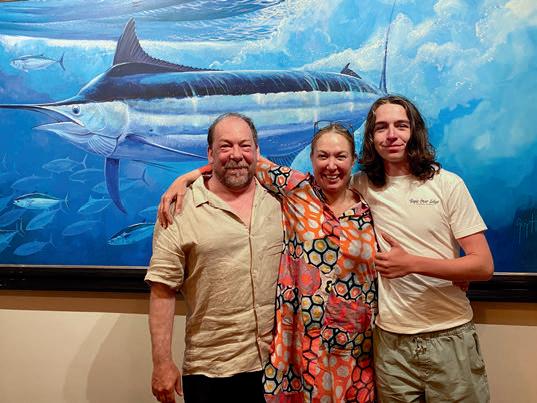
of them left Brooklyn for thirteen months and hunkered down in Shelburne Farms, Vermont, where Bill’s siblings and mom were in close proximity. It was a rare respite for a family always on the go, but it still managed to include a film project—an episode of With/In, a series of Covid-era shorts created by Trudie Styler (Sting’s wife) and available on Amazon—in which Silas co-starred with his parents and held the camera most of the time.
Their nine-minute segment, “In the Air,” offers an intimate look at a quarantined family that finds a way to pivot from the internal pressures and craziness of Covid, to looking outward—at nature, at each other— and finding a measure of solace and silence amid the fear and cacophony. It was very much based on their own early, terrifying days of the pandemic, and very much reflective of their “threelegged stool” of a family.
“The joy of the company of the three of us, that all is very real, and that was very much our thirteen months up there, and what we try to integrate and include in our lives all the time,” Bill says.
He and Silas, that rare teen who seems uninterested in social media, are happy to play guitar with each other for hours. Elizabeth spins clay and throws pots at a studio near home. He is perfectly at peace with his place as Hollywood’s go-to supporting character actor.
“I have a beautiful life, I really do. And only when I think it is not beautiful is it not, and that’s only because I am thinking it,” Bill says. “It is always beautiful. It really is.”
24 Groton School Quarterly Winter 2023
Camp family
by Amy Ma ’23 October 14, 2022

Finding Magic
“As humans we are inclined to feel that life must have a point. We have plans and aspirations and desires. We want to take constant advantage of all the intoxicating existence we’ve been endowed with. But what’s life to a lichen? Lichens are just about the hardiest visible organisms on Earth, but the least ambitious. Yet its impulse to exist, to be, is every bit as strong as ours—arguably even stronger. If I were told that I had to spend decades being a furry growth on a rock in the woods, I believe I would lose the will to go on. Lichens don’t. Like virtually all living things, they will suffer any hardship, endure any insult, for a moment’s additional existence. Life, in short, just wants to be.”
At the ripe age of five, magic was taken away from me. A change in my parents’ jobs had transported me from my carefree early life in suburban Australia to a traditional boarding elementary school in northeastern China. Barely fluent in Mandarin, I found myself hurled into an alien education system that I could only describe as Spartan with a sprinkle of Communist flavor. Every school day was planned out with great precision: wake up at 5:30 a.m., jog laps single-file at
6:00, sing the national anthem at 7:00. Twelve bunk beds squeezed into a space narrower and stuffier than the mosh pit in the student center. All this training was not without its benefits: The rigidity of boarding school instilled in me a strong sense of discipline and work ethic, for which I am eternally grateful. At the same time, though, I knew that there was something terribly lacking in my education. It was a gut feeling—a peculiar hollowness—that I sensed whenever math class replaced

A CHAPEL TALK
VOCES www.groton.org 25
— Bill Bryson, A Short History of Nearly Everything Amy at age 16, pictured at Goolwa Beach in southern Australia.
art class, or when my literature teacher would scold me for reading Geronimo Stilton instead of anything more “substantive.”
I soon identified the reason behind my agitation: There was no magic in Chinese boarding school. Actually, it is better to say that no magic was allowed in Chinese boarding school, but, frankly, it’s impossible to prevent children from being children. Instead, we learnt to find magic in the smallest crevices. Lichen and caterpillars became my closest teachers. These curiosities bewitched me, and I would spend hours researching their habits in the brick wall behind my school building with a spellbound zeal that never arose when memorizing poems for homework. Compared to the ritual decorum of The Analects, eight-year-old Amy was much more invested in the welfare of the roly-polies that she hid in empty yogurt cups. For years I borrowed the same book, titled Slugs and Snails, again and again from the school library, and I flipped through the pages until the edges curled up and I could distinguish precisely between the shells of a grove snail and a white-lipped snail.
The beautiful thing about learning is that no one can take it away from you. Despite the harshness of Chinese boarding school, I cherished the four years I spent there precisely because it taught me to always check the gaps and look under rocks. Though so unassuming, those places often bustle with the most life and diversity. The brick wall behind my school building offered me a glimpse into a world beyond the knowledge prescribed to me in state-approved textbooks. And so during every lunch break, caterpillars became my outlet and my escape. In these cracks and crevices I felt free: free to explore, free to make mistakes, free to interpret and create. That was liberation, I knew it.
During my tri-annual, fourteen-hour, cross-Pacific plane ride from Boston to Adelaide, Australia, where I live now, I’ve had a lot of time to think about why I learn. My father was born in a very poor village in central China and was actually a soccer recruit with a dream of playing pro until he gave that up to provide for our family. My mother emigrated across the world from China to Australia, alone with my brother and me, so that we could

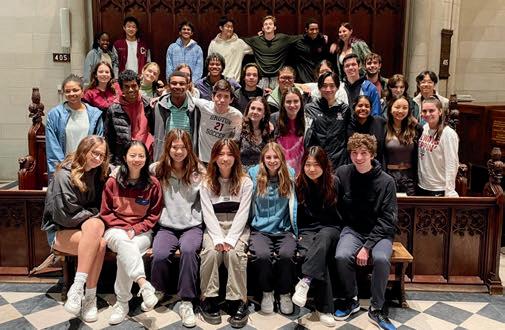
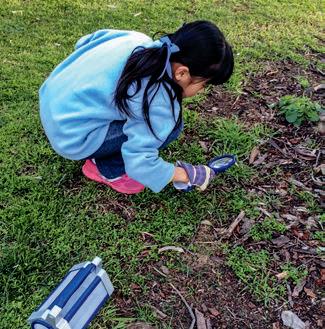
26 Groton School Quarterly Winter 2023
Clockwise from right: Amy (far right) rowing with teammates; Amy in St. John’s Chapel with friends after delivering her Chapel Talk; Amy exploring in her backyard at age seven.
escape the school system we found in China. All this effort was to give my brother and me a good education. As such, I’ve always felt an immense burden to make the most out of my time here, because I didn’t know how else to repay them, or to satisfy myself.
Other than our love for bagels and breaking rules, there perhaps aren’t that many things that unite Groton students more than our common valuing of education. We choose to leave our families, our friends, and our comfortable little circles of familiarity to attend Groton because there’s something about Groton’s education that we crave. But during the third +30 of the day, or in the midst of late-night cramming sessions, it’s easy to feel like none of this has much purpose. And to an extent, this is true: Most of what we learn in school will probably be forgotten.
Well, not all is lost. Obviously, I use advanced calculus to count down the days until Shrek 5 is released, and the Classics Department will repeatedly try to convince you that pretentious Latin phrases will make you seem a lot cooler at cocktail parties when you’re forty years old. Beyond that though, most of what we’ve read and learnt has faded from our memory. The books we’re currently reading will, in a short time, vanish into a few images or ideas. So will this chapel talk.
But perhaps none of it really goes away: We forget the author, the plot, the characters, but the essence remains somewhere in us. The shadows of lost knowledge cling to us as stubbornly as lichen clings to rock, nourishing our minds like a mental fertilizer, making us a little cleverer, kinder, and more complicated than we would have been if left to our own devices.
It becomes clear then that, as many older and wiser people have said before me, the goal of education is not so much to teach facts as to encourage thoughts. Empowerment and liberation are overused words, and ones that seem to have little value when thinking about the future an eighteen-year-old faces when they walk down the aisle on Prize Day. But the purpose of learning
is not, I think, to make us perfect in any discipline we study, but to open our minds so that we will be capable of anything when we apply ourselves to it. Fundamentally, we learn to liberate our minds, to make ourselves more fluid and malleable, just as the bugs in the brick wall in Chinese boarding school did to me.
So back to my parents. Everything they had worked for, all their years of study, menial jobs, applying for green cards and eventually citizenship in Australia, had been to purchase for my brother and me this one privilege: to see and experience more truths than those given to them, and to use those ideas, histories, and perspectives to create something of our own.
We live in a difficult world. Profound systemic racism, economic inequality, and environmental crises are just some of the issues plaguing humanity’s present and future. The news app on my phone this morning featured articles on Putin’s order for more drone strikes in Kyiv. Thus, to say that the purpose of education is to get a job seems inadequate. Instead, we learn not only to free ourselves, but also to liberate others. How will we help others achieve freedom? Everyone’s answers will be different. Some of us will be architects or doctors or engineers, while others will be linguists or ecologists or online dating profile ghostwriters—yep, that last one is a real thing. But I know one fact—the world requires those contributions.
Most of you are probably familiar with the idea of the Groton bubble. When you stay too long in this place, you forget just how big and expansive the world is. You lose any sense of the lengths of those longitudes and latitudes. It’s easy to obsess over the smallest mistakes. But in those moments, I like to remind myself why I chose to be here—not to be perfect, but to learn to be free. In fact, we learn more from mistakes than any form of praise.
And the education we receive at Groton isn’t just restricted to our 5+1 course load. Long walks along the banks of the Nash have taught me more lessons than I can count: From dandelions, I learnt optimism; clovers, humility; banksias, resilience. Thank you to the people sitting in the fan section below me—and to the teachers sprinkled around this Chapel—for teaching me, for molding me into the person I am today.
Some people learn in order to acquire knowledge and skills; others learn for mental soberness. I learn simply to be free, and to free others. Listen to how a kettle whistles to tell you that it’s ready. Watch a butterfly emerge from its chrysalis. Revel in the mystery of how an acorn becomes a huge oak tree. As young Amy realized during her Chinese boarding school years, when you look closely, even the most mundane and the most marginal are laced with spells, charms, and wizardry. I learn, too, so that I can become a sorceress. Hopefully, my wildflowers will someday grow from gray, soulless stone. And what is magic, if not that?
VOCES www.groton.org 27
“When you look closely, even the most mundane and the most marginal are laced with spells, charms, and wizardry.
by William J. Vrattos ’23 December

14, 2022
Taking Risks
A READING:
I saw the sunset yesterday, And it was, as sunsets so often have a habit of being, Beautiful.
But the mountains off in the distance were cloaked in this Striking, vibrant dark blue color that I don’t think I’d ever seen, And it reminded me of you.
And the way you’re so much like that sunset. Because while you’re so bright and beautiful You constantly explode with contagious radiance that makes everyone around you feel and act beautiful too,
Even when the color of their day is the darkest of blues. But you don’t do that for fifteen fleeting minutes a day. You are that sunset one hundred percent of the time, Which is crazy, Almost as if the world, Or at least my world, Revolves around you.
—William J. Vrattos
“What are you doing?” he inquired. I looked to my right, searching for the source of this familiar phrase, and discovering a wild-eyed, wispy-haired Paulo Ley Duarte at my side. He was chastising Ebun as she fumbled with an icing bag with the look of someone who had never decorated a gingerbread Supreme Court Building before. Meanwhile, I swore under my breath as I misplaced a Smartie. “All we have left are yellow, red, and green,” announced Oliver, out of the blue. Realizing some of our M&M’s had been stolen, he clenched his mighty jaw to restrain his barbaric rage. The table became quiet as one thing became clear: we were at war. Our determination, like so many of us subpar calculus students, knew no limits. We focused up. We took care of business, we shouted at people for no reason; and though the altos put up a fight, with frosting nearly as sharp as their singing, the tenor section coasted to a routine victory in this year’s choir gingerbread contest with minimal difficulty and maximum hostility.
As I left Mr. Moriarty’s house later that afternoon, I couldn’t help but think about how much I love choir, and Paulo, and Ebun, and Oliver, and all the other people at Groton who know that they can always yell at me as loud as they want. Riding this high, I continued that wonderful Sunday with a walk around campus, timing my arrival at the top of the Gemmell-Hughes* hill to be at the instant the sun began setting. The sunsets there are always really intense, and every ounce of every color burns itself into my heart. Even the saddest, deepest blues and the grays of the lifeless winter scenery are
A CHAPEL TALK
28 Groton School Quarterly Winter 2023
* The name has stuck for the area behind where former faculty Craig Gemmell and Nancy Hughes lived before they left Groton in 2015.
seared into my memory. And yet this opportunity to feel so many emotions at once, somewhere so beautiful, was tragically and unforgivably short. And it slipped away before I could figure out whether to say hello or goodbye. It would be really great if there happened to be a convenient metaphorical connection between this and my time at Groton, because then I could explain it to all of you to make you think I’m smart, but rest assured, that’s not what’s happening here.
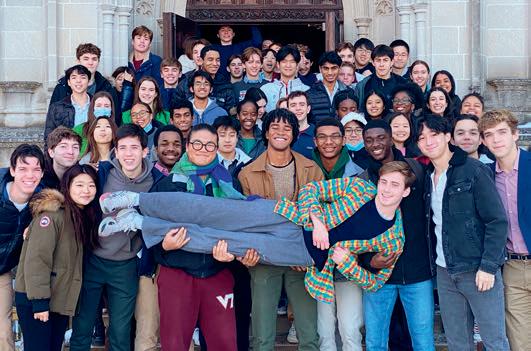
So going back to that particular sunset on that particular Sunday, the sky was unnaturally and strikingly beautiful, almost like someone could write a poem about
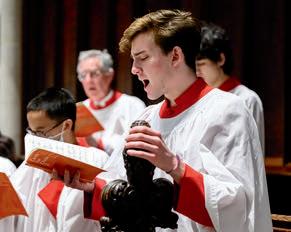
it. But no new ideas came to me. My mind grasped all around for interesting thoughts, but it felt like I was walking through a boring haunted house: nothing jumped out at me. So I thought back to a poem I had written about a similar sunset a couple months ago, which Charlie very kindly read for us just now.
I made it about a person, because I like to write about people more than fancy poet things like sunsets, and I happen to think that that certain person is pretty cool. I had a bit of free writing time at the beginning of an expo class, so I began to describe how I felt about her. But the more I wrote, the more I realized it was
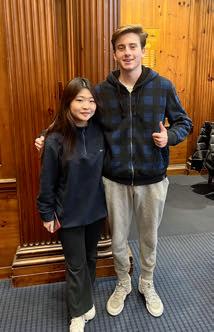
VOCES www.groton.org 29
Clockwise from far left: Will with Michelle Kim ‘23; Will singing during Lessons & Carols; and Will with friends outside St. John’s Chapel after delivering his Chapel Talk.
Adam Richins
turning into something that felt like a bit of a confession, because I really wanted to show the poem to the person who inspired it, and, to be honest, I also wanted to tell her that I had a crush on her. So I showed her the poem. I thought to myself: “What’re you doing?” She actually said she liked it, we moved on with our days, and a little while later, I asked her out and I got rejected. This is where things get crazy. Because I did not care at all. Even after feeling so moved as to write a poem and express my feelings about someone in a way I’d never done before, and, I might add, in the most vulnerable, embarrassing way I could possibly do it, I still felt nothing. Perhaps a little bit of gratitude that she handled things with maturity and kindness, and didn’t call me an idiot, but truly I didn’t feel pain or heartbreak or all the mushy, gross stuff I thought I would have to feel. And I’m not sure, but I suspect the reason for that is that I was really proud that I was able to handle taking risks, including telling people how they make me feel with complete honesty.
I’ve been taking risks a lot lately, and I’ve frequently looked very stupid doing so, but for some reason, it mostly seems to work out okay. I can think of no better example of stupidity turning out okay than my fall term exam for Señor Fernández’s Spanish class. On the exam, he asked that we create a dialogue between two fictional characters to demonstrate all the knowledge and understanding we had acquired in his class. So I created a necklace. I wrote little bits of my characters’ conversation on pieces of paper, ripped my blue book to shreds, poked holes in said shreds, and tied a piece of string through them to create a truly hideous mess, much to the surprise of Señor, and much to the abject horror of poor Ben Milner, who had to sit next to me the whole time. Being in a different, and presumably less creative, class, since
I saw no ripping coming from his side of the aisle, Ben had to sit there, probably conjugating verbs or something, like a nerd, and watch as I stopped writing with an hour left in the exam and began a forty-minute arts and crafts session, complete with poking, ripping, shuffling, and a cough that sent thirty pieces of paper scattering across the Schoolroom floor and me scrambling after them. After the exam, Ben greeted me in the Dining Hall with a “Vrattos, what were you doing?” and I’ve never been more proud. Even living in the uncertainty of having no idea what Señor Fernández would think of my artwork, I felt completely sure that I had taken the right approach to the exam.
I am still living in uncertainty. In a couple days, I’ll find out whether or not I’m into college, and I couldn’t care less whether they say yes or no. Because I know that no matter where I end up next year, I’ll find new ways to embarrass myself, and I’ll have new people to ask, “What are you doing?” and I’ll have new jokes and mistakes to look back on and think, “What an idiot.”
At Groton, it’s the little things that make life so interesting. Take Michelle Kim, for example. She’s really small. Which is interesting. I hope she doesn’t get mad at me for making that joke, but then again, I’m all the way up here. What’s she gonna do? Yet another risk bravely taken.
So for now, I’m gonna enjoy my last Lessons & Carols and finish out my Groton choir career on a high. I’m gonna keep telling people how much I love them, even if I have to write dumb, cheesy poems to do it. I’m gonna rip apart every expectation and every blue book that comes my way this academic year. And I’m going to recommend that those of you who are brave enough try to do the same. Because if you don’t, I just have one question: “What are you doing?”
“So for now, I’m gonna enjoy my last Lessons & Carols and finish out my Groton choir career on a high. I’m gonna keep telling people how much I love them, even if I have to write dumb, cheesy poems to do it.
30 Groton School Quarterly Winter 2023
“I was really proud that I was able to handle taking risks, including telling people how they make me feel with complete honesty.
A CHAPEL TALK
 by Samuel Winkler ’23 October 31, 2022
by Samuel Winkler ’23 October 31, 2022
An Accidental Breach
Good morning. I have something to get off my chest. I’ve been saying throughout this year that I’ve never cursed before. I must admit that statement is a lie. I have technically cursed before—all thanks to the poet whose work we all read this summer, Richard Blanco.
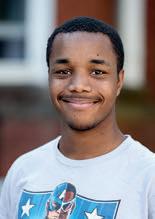
Saturday, September 10, 10:30 p.m. I sit in my room, frantically searching for The Prince of Los Cocuyos from the minefield of unpacked boxes and trinkets scattered across my floor. As I excavate the pile of posters and Legos, I find the treasure I was looking for, rejoicing like I was Indiana Jones. But as always, the prize was cursed. I leap onto my bed, and open the book for the first time, hearing the fresh pages separate from each other. I make my way methodically through the first few paragraphs, then my eyes stumble upon a Spanish word that I didn’t understand. It starts with M. It taunts me, as if it were whispering in my ear, “Translate me, you French-studying fool! Do it!”
The neurons in my brain scramble to dig through any knowledge that I had gained taking third-grade Spanish. Nothing. Thanks, Señora Renderos. I hang my head in shame and look over the balcony of my loft, down at my roommate Robert, a true expert in the Spanish language. “Hey Robert, what does m-i-e-r-d-a mean?” He then blurts it out plainly. I had apparently said the Spanish translation of the S word.
I stumble, nearly falling into my beanbag chair, as the rate of my breaths starts to accelerate. I find my footing, but my feet itch to frantically pace around my room as some sort of remedy. “No. This can’t be how it happens! Not like this! How could I?” My lungs expel air choppily and I continue to walk. I feel my sides start to collapse in on themselves, as if my rib cage were decomposing into mulch and being packed around my heart.
Why this reaction? My first thought was, “Samuel, it’s a long streak coming to an end, that’s how it always feels.” This seems like the right answer. We as humans are resistant to change, even miserably scared of it. But I think what happened to me that day goes deeper than that.
Growing up on Long Island, which, for the record, is a part of New York, I lived a different life than I do here. I lived in the world of The Great Gatsby, going to extravagant parties, attending soirees at fancy country clubs, and spending my Friday afternoons chilling in the mansions of my classmates. Even though I was invited into their society, I didn’t feel welcome. Maybe it was because I didn’t look like them, maybe because I had to drive forty minutes to reach their kingdom. Probably both. But every moment spent on the inside felt like I was being put under the biggest microscope in the world. Even though my friends had the freedom to say whatever they wanted, I had to watch my tongue in fear that their parents or even the maid would hear. Any mistake of language could mean that I could never see my friend again after school, or my eternal banishment from any fun occurrences on the weekend. Cursing was never an option. I fully believed in the opinion of my friends’ parents. Cursing, or messing up in general, meant that I was less worthy of a human being. Less worthy of friendship. Less worthy of love.
www.groton.org 31
Adam Richins
So I continued my streak throughout my middle school days. Whether it was a crushing Jets loss to the Patriots, a rocket accidentally blowing up on the launch pad, or blanking on a solo in front of hundreds of parents, I still didn’t curse. But soon my friends began to notice my “strange” unwillingness to let it all out. One of my best friends often joked that cursing will be incremental for me, that it would take until I’m on my deathbed until I said a truly terrible word. I always laughed it off, but I knew that there was a chance that it could be true.
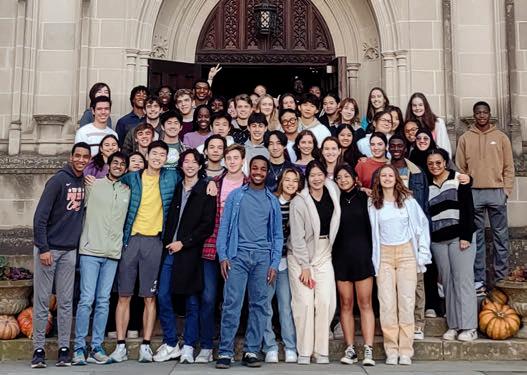
Another, much funnier motivator for me not to curse was TV. I’m sure most students here know the hit show Jessie from our childhood. I distinctly remember one episode, where the smart, painfully stereotypical character Ravi failed his first test ever. It sparked something in him, something ugly and sinister. He showed up the next day to school in a leather jacket, riding a motorcycle, and generally being nasty. While in retrospect it was meant to be a source of comedy, I took it seriously. I believed that such a small thing as a grade or the slip of your tongue can change you forever.
I arrived at Groton still chained to my marble pillar of not cursing, still reliving my middle school days. High society still pulled me closer, its links tightening around my wrists and throat. No one ever called me out for not cursing, so I continued to validate these thoughts. But as I grew older and became more mature, I figured out the mousetrap that I had unknowingly pushed my brain into. At Groton, there were no Long Island parents or maids to worry about, so I just played it off as the idea that “cursing isn’t necessary.” That’s what I told the few people who asked why I didn’t do it. But I see now that the real reason is because of Jessie. I’m afraid. I’m afraid of what would happen to me if I were to curse. Would I not be able to rein in the floodgates, as my brain washes away
into the cold sea of immorality? Would I be less likely to offer help to someone, to pick them up when they’re down? Would I be less likely to go to Dunkin Donuts early on a Sunday, just to get munchkins for my dorm? How could I be loving, kind Samuel Winkler if I cursed? As strange as it seems, these were real questions that I asked myself.
Let’s return to Saturday, September 10, 10:30 p.m., now with a little bit of context. It took me about fifteen minutes for my hyperventilating to slow down, and for me to be able to rest on my bed somewhat peacefully. Then and there, I had to make a decision. Now having settled down, all that ran through my head was: “What about my chapel talk? What am I going to write about? Should I curse again? Does it even matter anymore?” In the time since then, spending day and night looking over that one word from Richard Blanco, I think I’ve found an answer to my complex relationship with cursing, and with the idea of self. And it has to do with a language that some of us here love, and some of us here hate: Latin.
My favorite line from Vergil is in the Aeneid. Mene incepto desistere victam? Am I, having been conquered, to desist from my undertaking? For me, it’s the undertaking to be a good person, to be there for people. So am I to desist from it now that I have been conquered by a curse word? Absolutely not. Whether at the end of this talk I decide to curse or not doesn’t matter. When I’m done speaking, I’m going to enjoy the hymn and musical offering as Samuel Winkler. I’m going to class as Samuel Winkler. I’m going to wake up every single day for the rest of my life, still Samuel Winkler. The same goes for everyone here. None of us is defined by one personality trait, quirk, or interest. And we shouldn’t be afraid to push the boundaries of who we can be. It’s about realizing that there are blank pages ahead, and so many pens and pencils to write with.
Anthony
So looking at these pages, filled with words of my past and present, I ask myself the question: “Do I think that cursing will change who I am as a person?” Damn, I don’t think it will.
32 Groton School Quarterly Winter 2023
— Chelsea
Write or draw with color instead let those pages act as a symbol Of prosperity; that should be embedded Into all pens, color is contagious
Sam with friends in front of St. John’s Chapel after delivering his Chapel Talk.
Bowen Blair ’72 A Force for Nature
Nancy Russell’s Fight to Save the Columbia Gorge
A Force for Nature is a biography of Nancy Russell and her successful campaign to establish and protect the Columbia River Gorge National Scenic Area. Environmental attorney Bowen Blair tells the story of the unlikely activist who fought one of the most fiercely contested conservation battles of the 1980s, interweaving it with the natural and political history of the legendary landscape that inspired her.

The eighty-five–mile-long Columbia Gorge forms part of the border between Oregon and Washington and is one of the nation’s most historic and scenic landscapes. Many of the region’s cultural divisions are at a boil here urban versus rural, west of the mountains versus east as well as clashes over private property rights, management of public lands, and tribal treaty rights. In the early 1980s, as a new interstate bridge linked Portland to rural counties in Washington, the Gorge’s renowned vistas were on the brink of destruction. Nancy Russell, fortyeight years old and with no experience in advocacy, fundraising, or politics, built a grassroots movement that overcame seventy years of failed efforts and bitter opposition. The Columbia River Gorge National Scenic Area Act barely passed— on the last day of the congressional session in 1986 and was signed by a reluctant President Reagan.
Bowen Blair is former executive director of Friends of the Columbia Gorge, and senior vice president of Trust for Public Land. In the Columbia Gorge, Blair helped draft and lobby the act that established the country’s most prominent national scenic area and negotiated the purchase of thousands of acres for public parks and tribal homelands. He was later appointed by two Oregon governors to the Gorge Commission, which he chaired.
Amy Ma ‘23
The Seed Still Grows: A Graphic History of Australian Bushfires
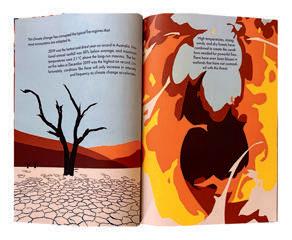
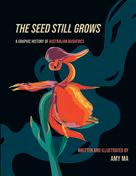 Edited by Robert D. Eldridge
The Memoirs of Ambassador
J. Graham Parsons: A Foreign Service Life
Edited by Robert D. Eldridge
The Memoirs of Ambassador
J. Graham Parsons: A Foreign Service Life
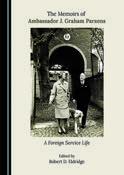
US diplomat J. Graham Parsons 1925 had a lengthy career in Foreign Service, working in pre-war Japan, China, and Cuba; in Canada and Washington, D.C., during World War II; and postwar India, Japan, Laos, and Sweden, among other assignments, and was the deputy chair of the U.S. SALT I Delegation, 1970–1972. Parsons’ memoirs, edited by Asian historian Robert D. Eldridge, offer insight into his interactions with some of the most famous figures in 20th century politics and diplomacy.
Scholars have characterized him as hawkish, but the memoirs reveal a diplomat more nuanced than that. He was loyal to his employer, and his thoughts and actions reflected the policies (if not always the politics) of a particular administration. Indeed, he was a traditional diplomat of the old school, and expressed concerns in the concluding chapter about how diplomacy specifically, the State Department—was evolving, and the overpoliticization of American foreign policy prior to his passing in 1991.
This graphic depiction of Australian bushfires is a striking synthesis of environmental science, art, and advocacy, illustrating the unprecedented bushfires in 2019 and 2020. Forty-two million acres were ravaged and over one billion animals killed in what came to be known as the Black Summer. Yet despite alarmingly intense and frequent fires in recent years, wildfires are also an awe-inspiring natural phenomenon that has shaped Australia’s landscapes. “Australia is no stranger to fire,” writes Amy Ma. “The ecosystem is not slow to respond. Instead, almost immediately, nature triggers the cycle of ecological succession a multi-stage process of change and regeneration.” In Ma’s hands, the ways that plants and animals have adapted to cope with fire is a fantastical and uplifting exhibition of nature’s resilience.
Amy Ma is a Groton Sixth Former whose research and artwork became this love letter to the Australia bush, with 100 percent of book proceeds donated to the Kangaroo Island Regeneration
► Please send information about your new releases to quarterly@groton.org.
the authors
DE LIBRIS www.groton.org 33 Book summaries were
by
and/or publishers.
provided
new releases
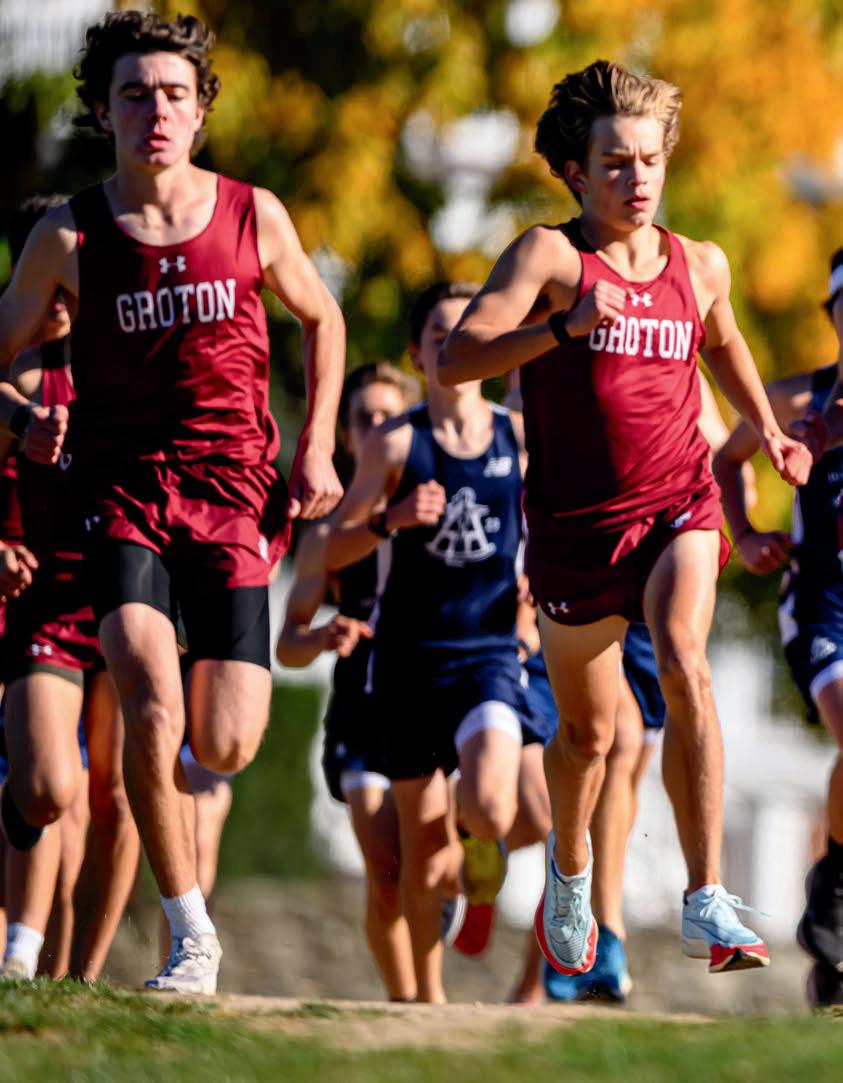
34
Photographs by Adam Richins
Fall SPORTS
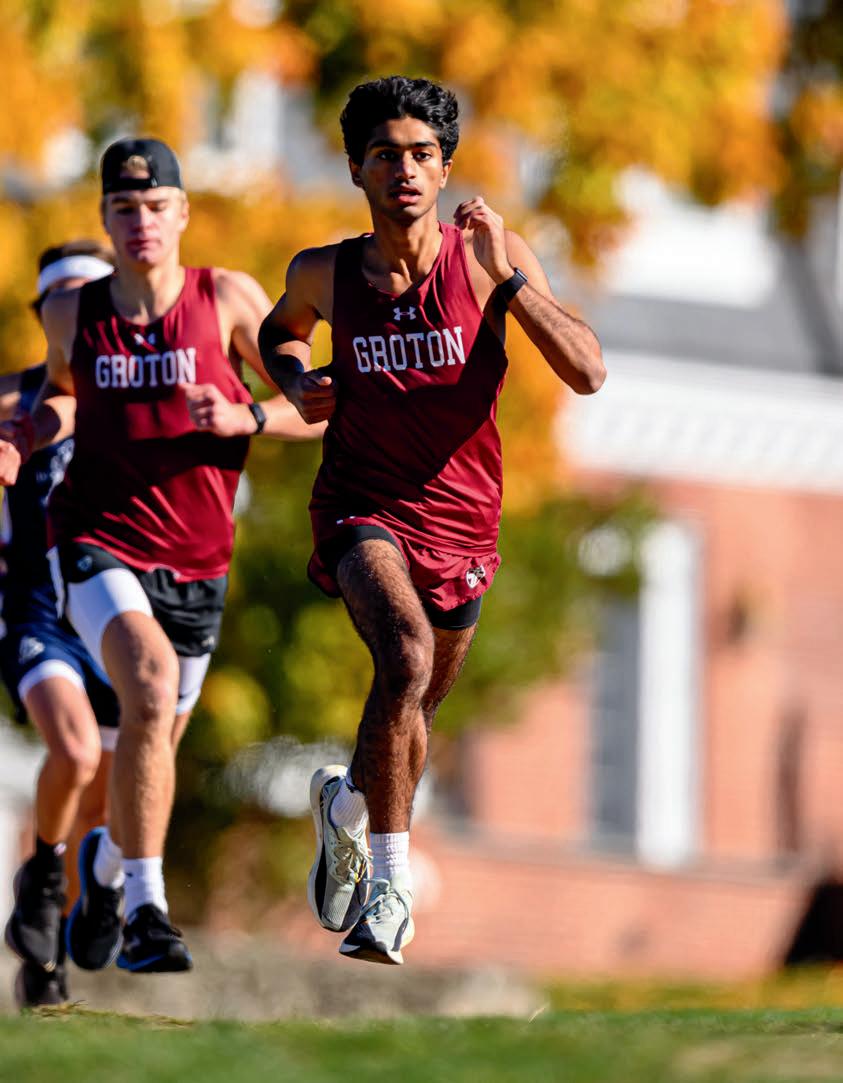
GROTONIANA 35
From left, Jack Lionette ‘23, Christopher Hovet ‘25, Ryder Cavanaugh ‘24, and Vivan Das ‘23.
Boys Cross Country 10 – 6
2nd in the ISL Championship, 2nd in New England Class B
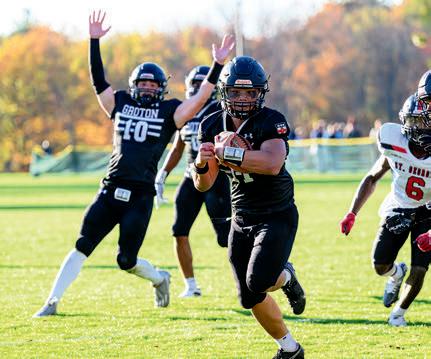
This year’s boys cross country team was a great group of boys who were extraordinarily dedicated to the sport, committed to improving every week through training: hill repeats, intervals, strength sessions, yoga, pool workouts, and many, many long, slow distance runs along the trails crisscrossing the New England fall landscape.
This was all done in hopes of shaving off a well-earned second here and there. And they did. The team recorded an impressive 57 personal records (PRs) during their races. And they capped off their season by
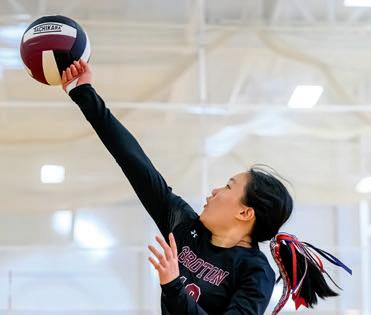

finishing second in the ISL championship a remarkable achievement, as they ran above and beyond their expected placing turning the heads of many within the ISL. Then they went on to support and validate this accomplishment by again placing second at the New England championship the following week.

We say a bittersweet goodbye to our beloved cross-country team captains; Jack Lionette ’23 and Vivan Das ’23 were gifts to the team, setting the pace for all our success throughout the season. They led through their commitment to running, and they combined this with a fun-loving, playful nature that made each practice a welcoming place to escape from the daily academic
demands. We will all miss them, but they are leaving behind so many who are eager to do for others as they have done for them not just in running, but in leadership.
The most improved award could go to more than half of the team, but we have chosen a runner who has dropped 3:30 from his time since last year, and bettered his PR four times: Chase Bellamy.
Jack, who has been our top runner since he arrived on the Circle, and Chris, who is the #1, #2 runner in all the ISL, both earned All ISL placement. Ayur, who ran a race at ISLs that bettered his personal best by over a minute, earned honorable mention within the league.
36 Groton School Quarterly Winter 2023
Coach Bert Hall
Girls Cross Country 5 – 8
The girls cross country team battled through injury and illness throughout the season with grit and determination. They faced the first race without their top two runners, but put together a respectable performance against a strong St. Paul’s squad. The following week only half of Groton’s racers were able to compete, and yet the team notched a pair of victories against Tabor and Rivers, while losing to a potent St. George’s team that would go on to finish third in the ISL.
They were closer to full strength for the next couple of weeks, and the girls bested rival St. Mark’s 15-48 on their home course. Losses to powerful teams from
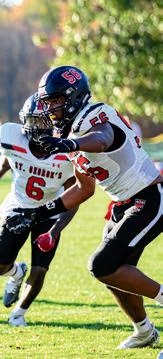
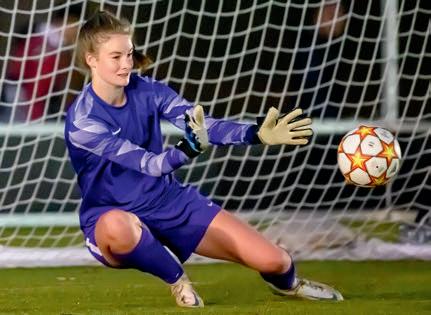
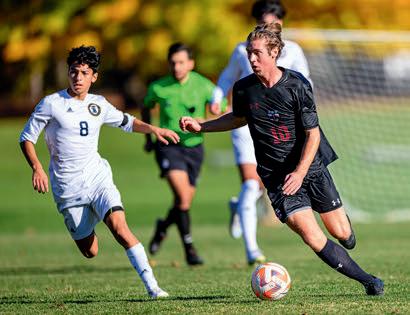
Milton and Governor’s were ultimately put in context when those went on to finish second and fourth overall in the ISL. Individual victories always make team wins even sweeter Ruby Fehm ‘24 earned an individual victory at home, as the girls beat Lawrence Academy 15- 48 even if they fell short of Thayer.
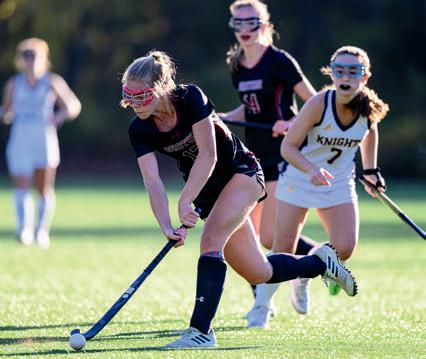
The Parents’ Weekend race was, in many ways, the highlight of the season, even though BB&N outpaced the Zebras. The girls raced fiercely on their home course to earn several individual bests, and Gabriela Gil ‘25 emerged as top finisher, fighting through a strong pack of Knights to finish second overall while earning a new PR by nearly a minute. Through much of the season,
Gabriela and Lindy Zhang ‘25 alternated as top runner, and their strong performances kept Groton in tough races in spite of other team absences.
The girls showed remarkable tenacity and good humor in the face of obstacles, and are grateful for the leadership of Sixth Form runners captains Lang Burgess and Christina Chen, as well as Charlotte Maturo and Brianna Zhang and many runners who stepped up by racing outside of their comfort zones. A significant number of varsity runners return next season, and the team looks forward to healing strong for the Fall of 2023.
Assistant Coach Mary Frances Bannard with Coach Michael O’Donnell
Opposite page, clockwise from left: Gabriela Gil ‘25, Sean Greene ‘24 and Bensen Han ‘23, Sophia Leng ‘26.
This page, clockwise from top: Danielle Shyjan ‘25, Jack Travis ‘23, and Morgan Fillion ‘24.
GROTONIANA www.groton.org 37
Field Hockey 8–7–1

This was an impressive season for the Girls Varsity Field Hockey team. The Zebras notched several key wins, including a comefrom-behind victory against St. Paul’s, a dominating home performance against Rivers, and a decisive 2-0 playoff-clinching effort against cross-town rival, Lawrence Academy.
This year’s team, led by captains Keira Ley ‘24 and Devon Mastroianni ‘23, truly embodied its motto, “that’s my sister.” With a large number of younger students on this year’s team, they relied heavily on our captains and Sixth Formers to set the tone. They showed up to the “coco” each
day, and struck a delicate balance between working hard and having fun. As a group, they impressively continued to show up for themselves and each other as the season progressed and academics became more demanding.
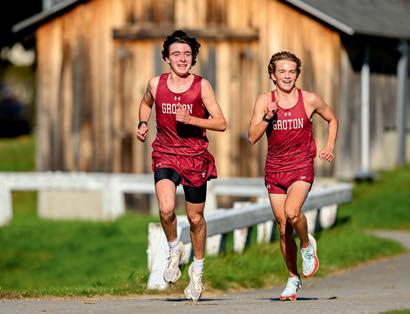
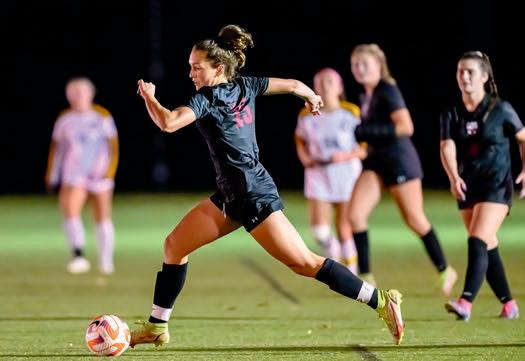
Throughout the season, the team talked a lot about “what lights our fire.” The conversation started after experiencing some “lulls” or brief “lapses” during games, which directly impacted the performance against strong teams. The Zebras reflected on what was needed from themselves and teammates in these moments, and even created a “pretend fire” with sticks in the locker room before one game. The joke was on coaches in the end, when the team
presented coaches’ gifts at the end of the season real fire pits.
Coach Kellie Walsh
Volleyball 4–8
The girls varsity volleyball team had a very competitive season, with several matches that went to five sets. One highlight was the BB&N match, where the Cambridge denizens visited Groton mid-season, having only lost one set until that point. The Zebras dropped the match in five sets, but not without giving BB&N two additional set losses to their overall record. The BB&N coach was quoted as saying it was the hardest match

38 Groton School Quarterly Winter 2023
This page, clockwise from top: Tyler Martens ‘27, Daisy Adinkrah ‘24, Jack Lionette ‘23 and Christopher Hovet ‘25.
Opposite page, clockwise from top left: Osric King ‘23, Sean Greene ‘24, and Ella Nannene ‘26.
they had played all season.
With the majority of the team returning next year, the future of volleyball at Groton looks very bright. The team will miss the leadership and friendship of Sixth Formers Sophia Bay and Kyra Minda.
Coach John Antonetti
Girls Soccer 6 –10–1
After beginning the season with high expectations, the girls soccer team ran into adversity in the form of players sidelined by health challenges. This resilient bunch embraced the need to be flexible, and many girls played new or different positions this year.
Sixth Form captain and goalkeeper Rose Shingles highlighted this flexibility in an early season comeback victory over Dana Hall. With Groton trailing 3-1 and 13 minutes remaining, Rose entered the match as a midfielder and made an immediate impact, scoring two goals for a 4-3 win. A week later, they earned important ISL victories against Milton and Rivers for the first time in many seasons, and competed valiantly in a series of matches against strong rivals including a 3-2 loss to BB&N, the undefeated Class A champion. But this was a compliment in disguise, as Groton was the only team to score two goals in a single match against the Knights over the past two seasons.
Groton faltered in the home stretch with
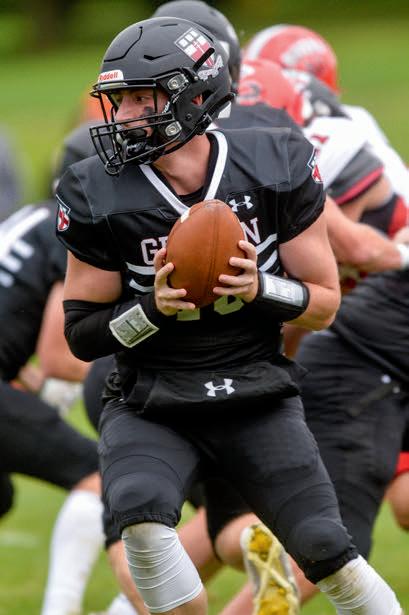
losses to Governor’s and Lawrence, but rallied for the final match against St. Mark’s, with Sixth Former Frances Waltz scoring a beautiful goal with less than a minute on the clock to earn the victory.
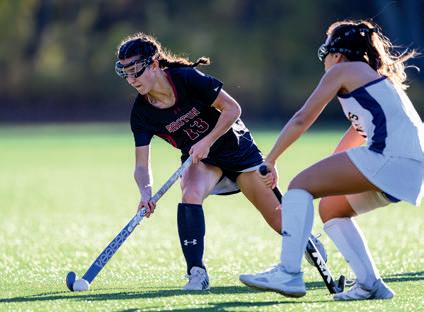
The Sixth Form group rounded out by Calen Cagney, Lindsey Manugian, and Aimee Zheng did an excellent job mentoring the younger players, and are poised to grow further as role models next season.
Coach
Ryan Spring
Boys Soccer 4 –9–3
The varsity soccer candidates came to preseason in early September with a great
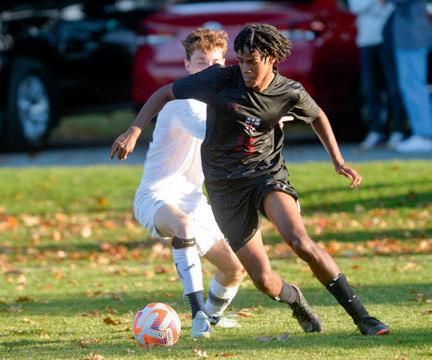
www.groton.org 39 GROTONIANA
Jon Chase
Jon Chase
attitude and a successful scrimmage against Proctor Academy. With a final roster of twenty-five players, the team was led by Sixth Form captains Henry Burnham and Jack Travis, along with thirteen other Sixth Formers: Jaden Adinkrah, Lars Fritze, Lucas Gordon, Patrick Kennedy, Osric King, Lucas Li, Zidane Marinez, Aidan O’Connell, Ayush Pillai, Robert Trowbridge, Will Vrattos, Charlie Weisberg, and Kiefer Wood.
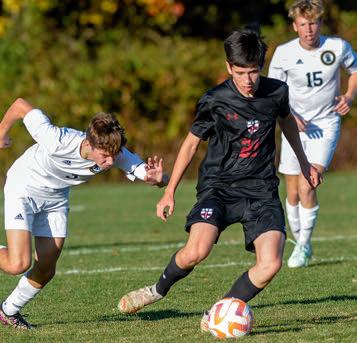
W ith such a veteran group, the team was able to gel quickly and get off to a fast start in a season bookended beautifully with great first and last games. In the first game of the season, Groton earned a hard-fought tie at St. Paul’s with a late goal by Jack Travis. At the end of the season, Groton retained the
Weidergott Cup with the best all-around performance of the season against St. Mark’s, winning 5-1 at home.
Jack Travis was named All-ISL and a NEPSAC All Star, and Henry Burnham was honorable mention All-ISL and a NEPSAC All Star as well. This large group of Sixth Formers will be missed, but they leave behind a great model for younger forms by modeling hard work and dedication.
Coach Joe Martinez
Football 4–3
This year’s Zebras faced challenges in the form of injuries and tough rivals, and still
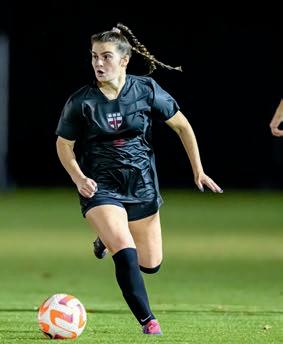
managed to pull out some of the most exciting victories in Groton football program memory. The season’s opening at Brooks was a tough a 34-14 defeat, followed by a second loss with The Rivers School at Groton. But these rivals represent two of the best small school programs, and even with this bracing start to the season, the team’s improvement and mettle over the previous year was already visible.
The tide turned in game three against Middlesex. The Zebras scored on the first offensive drive of the day, going for a two-point conversion, and by the end of the first half the score was 16 - 0. Both the offense and defense were hitting their
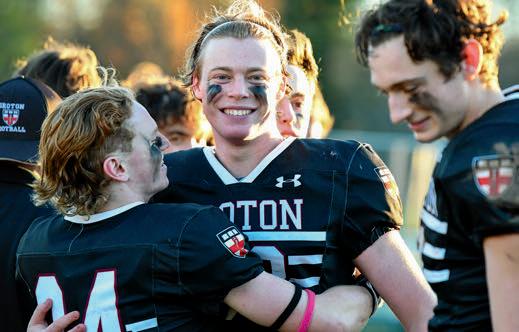

40
School Quarterly Winter 2023
Groton
Clockwise from top left: Charlie Weisberg ‘23, Karenna Beckstein ‘23, John Charpentier ‘25, Alec Konigsberg ‘23, and Henry Haskell ‘23, and Ruby Fehm ‘24.
Jon Chase
Michael Conti
strides in sync, and the final 26-0 victory was a bolstering return to glory.
The next game, against St. George’s, earned the nickname “the shoot-out at Groton School.” The Zebras scored on every offensive drive except three, punting twice. But whenever the lead seemed safe, St. George’s roared back to get within one touchdown. Groton’s defense in the exciting fourth quarter secured an eleven-point lead, and ultimately a thrilling 59-48 win.
Roxbury Latin is always a great place to play a game, and was an especially sweet backdrop when Groton recovered a fumble on the opening kickoff, and quickly turned it into an 8-0 lead. Midway through the second quarter, they scored again, going into the half with a 16-0 advantage.
Roxbury Latin scored on a long pass in the third quarter, but the Zebras answered early in the fourth, and won 26-6.
Their penultimate game was at Thayer Academy, and this southeastern rival scored first, late in the first quarter. Groton replied in kind, then went for a two-point conversion (which they’d been doing all season), making the score 8 to 7. Misfortune struck when Groton’s Quarterback suffered a thumb injury, forcing him out of the game. Insult added to injury, taking out a Zebra defensive end, and the resulting final loss was 38-8.
Next up was Groton’s rival, St Mark’s, and the Lions came to Zebra country this year. They were formidable at the beginning, but Groton’s defense held them to 6 points all day. This group of Groton Sixth Formers had never lost to St. Mark’s since they arrived on campus in their Second Form year. And this was a fitting finale, with a victory of 40 to 6.
This team’s accomplishments were impressive and earned a lot of respect from around the ISL, with seven players named to the ISL All-Star teams, including Sean Greene ’24, Bensen Han ’23, Forrest Nelson ’24, and Luke Romano ’23, with All ISL Honorable Mentions Henry Haskell ’23, Salim Hill ’25, and Patty Keegan ’24. All the Sixth Formers, including Michael Pelletier and Alec Konigsberg, will be missed on the football field, as well as across campus.
Coach Jamie Lamoreaux
BOYS CROSS COUNTRY
Most Improved Runner
Chase Bellamy ‘26
Coaches’ Awards
Vivan Das ‘23
Jack Lionette ‘23
All-ISL
Chris Hovet ‘25
Jack Lionette ‘23
All-ISL Honorable Mention
Ayur Vallecha ‘25
Captains-Elect
Ryder Cavanaugh ‘24
Jeremy Gall ‘24
Eric Ge ‘24
GIRLS CROSS COUNTRY
Most Valuable Runners
Gabriela Gil ‘25
Lindy Zhang ‘25
Coaches’ Awards
Lang Burgess ‘23
Christina Chen ‘23
Captains-Elect
Sheena Bakare ‘24
Ruby Fehm ‘24
FIELD HOCKEY
Outstanding Performance
Keira Ley ‘24
Ellie Smith ‘24
Most Improved Player
Colby Gund ‘24
Coaches’ Awards
Sydney Senerchia ‘24
All-ISL
Ellie Smith ‘24
All-ISL Honorable Mention
Maddie Cronan ‘25
All-NEPSAC
Devon Mastroianni ‘23
Ellie Smith ‘24
All-NEPSAC Honorable Mention
Keira Ley ‘24
Danielle Shyjan ‘25
Captains-Elect
Keira Ley ‘24
Ellie Smith ‘24
FOOTBALL
Coaches’ Award
Henry Haskell ‘23
Charles Alexander Awards
Bensen Han ‘23
Luke Romano ‘23
Most Improved Player
Alec Konigsberg ‘23
All-ISL
Sean Greene ‘24
Bensen Han ‘23
Forrest Nelson
Luke Romano ‘23
All-ISL Honorable Mention
Henry Haskell ‘23
Salim Hill ‘25
Patty Keegan ‘24
All-New England
Forrest Nelson ‘24
Luke Romano ‘23
All-New England Honorable
Mention
Sean Greene ‘24
Bensen Han ‘23
Captains-Elect
Sean Greene ‘24
Forrest Nelson ‘24
BOYS SOCCER
Most Valuable Player
Jack Travis ‘23
Most Improved Player
Will Klick ‘25
Coaches’ Award
Henry Burnham ‘23
All-ISL
Jack Travis ‘23
All-ISL Honorable Mention
Henry Burnham ‘23
NEPSSA All-Star Team
Henry Burnham ‘23
Jack Travis ‘23
Captains-Elect
Charlie Dubois ‘24
Will Klick ‘25
GIRLS SOCCER
Most Valuable Player
Karenna Beckstein ‘23
Sixth Form Award
Lindsey Manugian ‘23
All-ISL
Karenna Beckstein ‘23
All-ISL Honorable Mention
Morgan Fillion ‘24
Tyler Martens ‘27
All-NEPSAC
Karenna Beckstein ‘23
All-NEPSAC Honorable Mention
Morgan Fillion ‘24
NEPSAC All-Star
Morgan Fillion ‘24
All-State
Karenna Beckstein ‘23
Captains-Elect
Luisa Garciarramos Petricioli ‘24
Morgan Fillion ‘24
Julia Spada ‘24
VOLLEYBALL
Most Valuable Player
Alicia Guo ‘24
Coaches’ Award
Lauren Dubois ‘25
Rookie of the Year
Cheyenne Zheng ‘26
All-ISL
Alicia Guo ‘24
All-ISL Honorable Mention
Sophia Leng
All-NEPSAC Honorable Mention
Alicia Guo ‘24
Captains-Elect
Daisy Adinkrah ‘24
Alicia Guo ‘24
Rahma Ibrahim ‘24
Tyra Montan ‘24
Follow Groton Athletics on Twitter:
@GrotonZebras
www.groton.org 41
TWELVE ANGRY JURORS
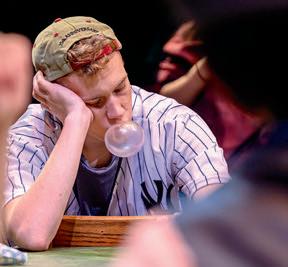
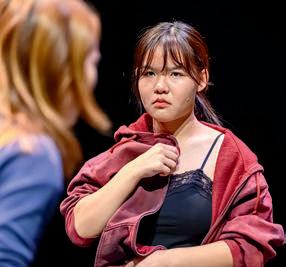
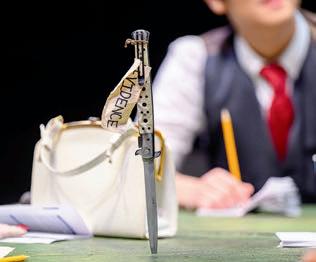
Twelve Angry Jurors, an adaptation of Twelve Angry Men by Reginald Rose, brought courtroom drama to the Campbell Performing Arts Center in November. As a jury deliberated the fate of a man accused of killing his father, one quiet holdout sharpened the meaning of “reasonable doubt” in a play that probed disturbing questions about racism in the American judicial system.
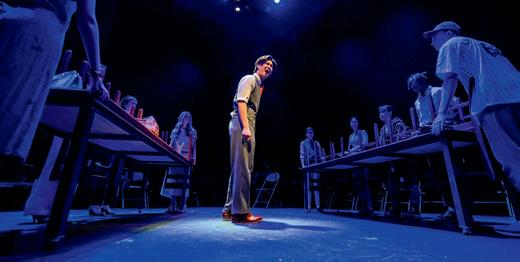
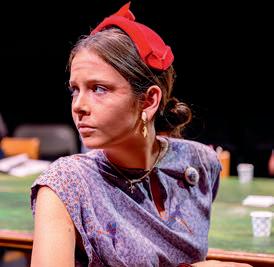
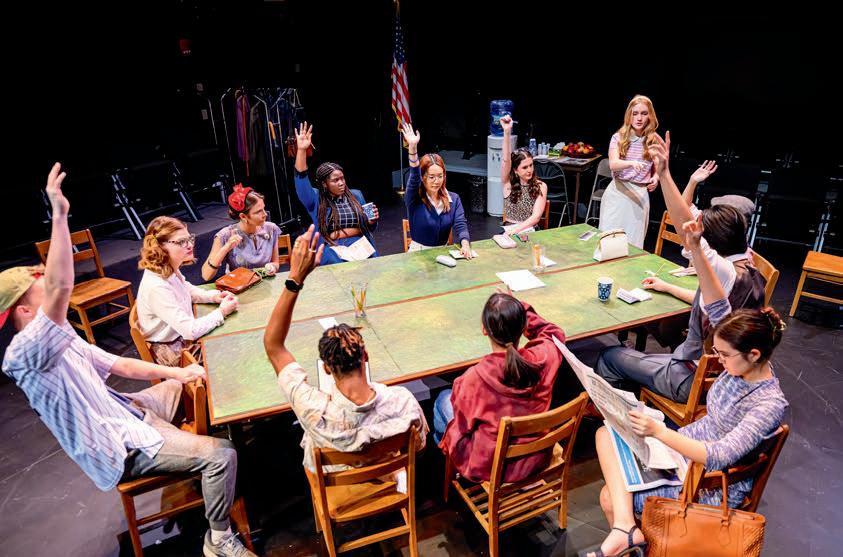
42
Photographs by Adam Richins
10
8 9
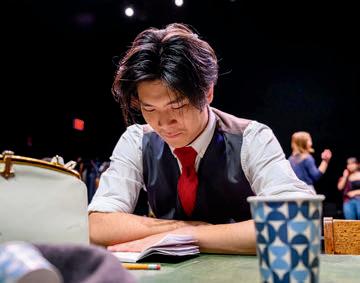
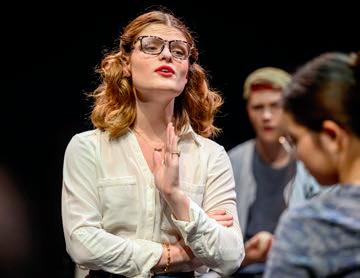

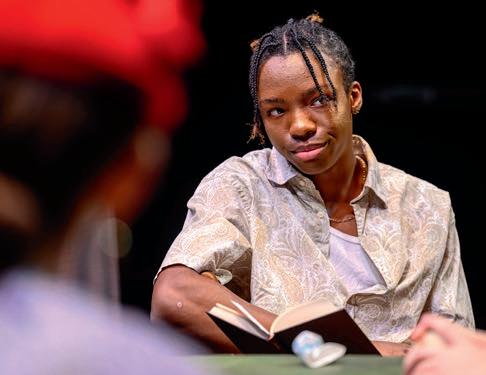
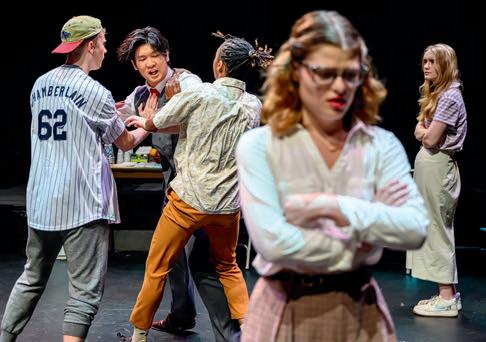
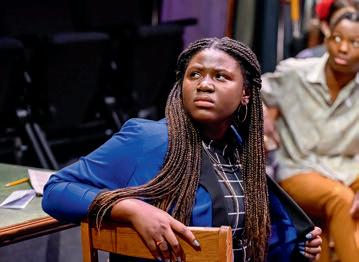
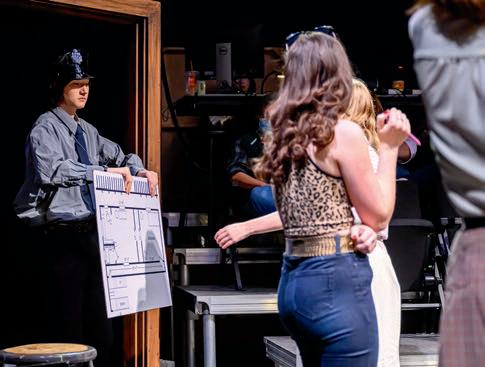 1. Jenny Polynice ‘25
2. Joon Whang ‘23
3. Tionbre Austin ‘26
4. From left, Timothy Hebard ‘24, Joon Whang ‘23, Tionbre Austin ‘26, Abi Hunnewell ‘23, and Georgia Martin ‘24
5. Abi Hunnewell ‘23
6. From left, William Laws ‘25 and Lauren Clark ‘23
7. Liam Riley ‘27
8. Timothy Hebard ‘24
9. Maya Luthi ‘23
1. Jenny Polynice ‘25
2. Joon Whang ‘23
3. Tionbre Austin ‘26
4. From left, Timothy Hebard ‘24, Joon Whang ‘23, Tionbre Austin ‘26, Abi Hunnewell ‘23, and Georgia Martin ‘24
5. Abi Hunnewell ‘23
6. From left, William Laws ‘25 and Lauren Clark ‘23
7. Liam Riley ‘27
8. Timothy Hebard ‘24
9. Maya Luthi ‘23
1 3 2 5 7 4 6
10. Sophie Zhu ‘25
MUSIC PERFORMANCES
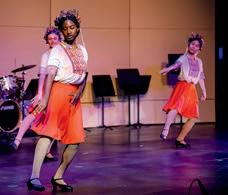
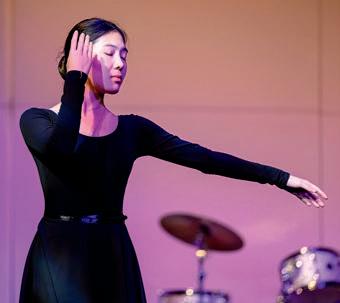
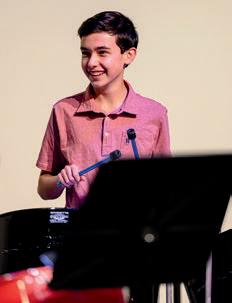
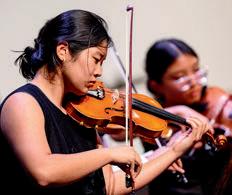
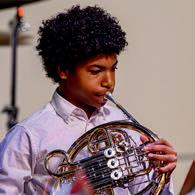
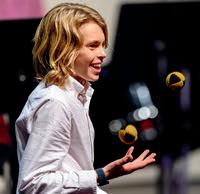
An annual highlight of Parents Weekend (see Parents from Near and Far Visit Groton for Parents Weekend, page 8 ) is an evening of performances by some of Groton’s talented arts ensembles in the Campbell Performing Arts Center. This year’s event included appearances by the Chamber Orchestra, Groton Dance, Groton Theater, the choir, Steel Drums, Maqupellas, Essence Step Team, and the “Soul Sauce” jazz ensemble.
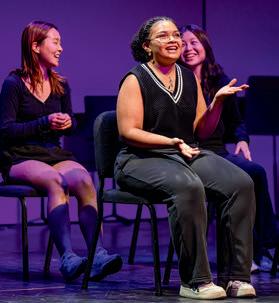
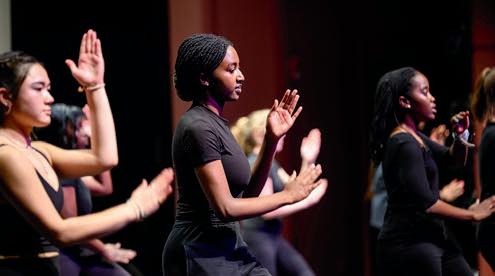
1 From left, Julie Xie ’23, Paulo Ley Duarte ’23, Sam Winkler ’23, Christina Chen ’23, Elizabeth Wolfram ’23, Lauren Clark ’23, and Bensen Han ‘23; 2 From left, Arianna Werkun ’24, Janice Darkwah ’23, Amber Gumira ‘23; 3 From left, Alice Liu ’23, Alyssa Hummel ‘23; 4 George Taggart ‘27; 5 Chase Bellamy ’26; 6 Janice Darkwah ‘23; 7 From left, Jessica Lee ’24, Afrika Gaye ’24, and Brenda Li ‘25; 8 Audrey Zhang ‘25; 9 Liam Riley ’27
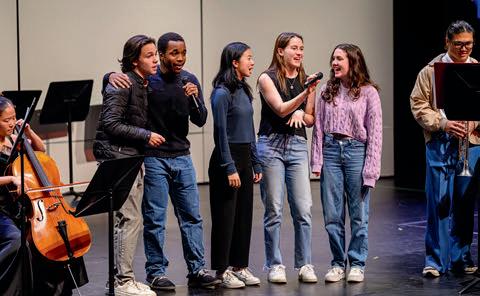
PA R E N T S W E E K E N D
44 1 2 3 7 4 5 8 6 9
Adam Richins
Peter Nitze ’53 September 17, 1935 –October 30, 2022
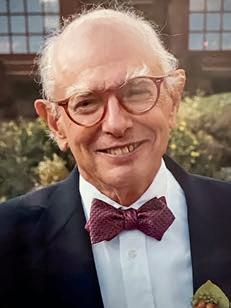 by Lawrence T. Perera ’53
by Lawrence T. Perera ’53
Peter was an unforgettable member of the Form of ’53. He was also one of my oldest and dearest friends. Our friendship began even before Groton, while we were classmates at St. Albans School in Washington, D.C. Our fathers had been called to the capitol during the Second World War—hard at work on the United States Strategic Bombing Survey—and the Nitze and Perera families became close friends. Our mothers served as den mothers while Peter and I were Cub Scouts together.
After the War, our paths rejoined in the fall of 1948 when we both entered the Second Form at Groton. The school had already begun to emerge from the Victorian era under the leadership of John Crocker and his devoted wife Mary. But there were still a number of
formalities that Groton School students were required to observe. As a precocious son of an old and distinguished family, Peter needed to make some adjustments to his behavior in order to assume his rightful place in the leadership of the form. This was a learning process for Peter, who preferred to pursue his own more independent path even when it would have been more convenient to follow the conventional route. It wasn’t long before Peter’s antics came to the attention of school authorities. His name began to appear on the black mark list posted on the bulletin board in the Schoolroom. On Saturday afternoons, Peter could be found walking in circles while his formmates watched the football games on the field below.
During the course of Peter’s atonement for his misdemeanors, he and Paul Wright came to know and respect one another. In time they became good friends, but there was one incident that could not be resolved without more serious consequences. One spring evening, Peter left Brooks House by means of the fire escape, and paid a visit to friends in Hundred House before getting caught by some Sixth Formers behind the Schoolhouse. This was too much for Mr. Crocker to allow to go unpunished, so arrangements were made for Peter to be returned to the custody of his parents for the rest of the term. While awaiting his departure, Peter’s formmates protested outside the window of his room in the infirmary, to which he had been confined, and scattered leaflets from the chapel tower: “Free Nitze now.” All to no avail.
When Peter returned to school in the fall, he was ready to apply the full measure of his talents to the benefit of the school community. Peter’s schoolwork took him to the top, or near the top, of the form. He became a devastatingly successful rebuttalist on Richard Irons’ debating team; his portrayal of Prince Hal in
IN MEMORIAM www.groton.org 45
P
Shakespeare’s Henry IV was worthy of the London stage, and brought honor to James Hawkes’ Dramatic Society. Peter’s powerful oar on the Groton crew even brought the trace of a smile to Jim Satterthwaite’s countenance. Groton School had found a way for Peter to prosper in the life of the school without losing his own sense of identity. Sixth Form year, Peter became a school prefect, and served as a right-hand man to Acosta Nichols. It could not have been sheer coincidence that Mr. Crocker invited Paul H. Nitze to deliver the Prize Day address that June.
After Groton, my friendship with Peter grew. We roomed together at Harvard College and we both went on to Harvard Law School. Thereafter, Peter moved to New York with his young family and took up the practice of law. In short order, he became a partner in the firm of Sherman and Sterling working on tax matters. Over time, Peter’s enthusiasm for this narrow specialty began to wane, and he considered other ways to put his considerable talents to good use.
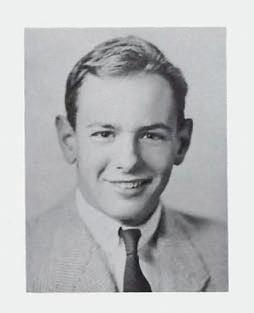
Historic real estate investment presented a worthy challenge, and goal: revitalizing old buildings, and communities. The first test of Peter’s ingenuity came when he took a major role in the careful restoration of the Dakota apartment building, where he lived and served as president of the board. As I visited Peter from time to time, he kept me up to date on the work underway to put this landmark structure back in pristine condition.
It was not long before Peter and his partner Frank Stagen acquired property in New York worthy of their preservation efforts, extending Nitze-Stagen’s work to the West Coast. In San Francisco they transformed a historic building and made it into a successful hotel in the heart of the city. Peter and Susan, his wife of fifty-one years, enjoyed frequent trips to California to check on the progress of Peter’s properties.
Susan enriched Peter’s life in many ways, and supported his strong relationships with his friends and the larger community, including Groton. Peter had always taken a particular interest in his children’s education, and
when they went to Groton, Susan took an active role in the school as chair of the Parents Committee. This led to her election as a trustee a few years later. The Nitze apartment in the Dakota building became the venue for gatherings of Groton alumni for a number of years thereafter.
Susan was an active philanthropist in education and the arts, and was also able to lure Peter away from his life in New York to accompany her on her regular sojourns to Italy as a trustee with the American Academy in Rome.
The years of Peter’s active and productive career in real estate led to a culminating achievement in Seattle: the reinvention of a colossal warehouse building that had been abandoned by Sears Roebuck. This was a two-million-square-foot challenge for which Peter was now prepared. He and his partners transformed this long-vacant “dinosaur” into an award-winning world headquarters for Starbucks, earning the praise of the real estate industry as well as preservationists and the architectural community. For Peter, this grand project epitomized both the core values of his company and ambitious dreams of his youth.
As much as he thrived in the city, Peter was every bit at home in the country. He and Susan made the working port of Stonington, Maine, their home away from home. It was to their house and island cabin that they repaired in the summer, and in other seasons of the year, for rest and recreation. Peter delighted in the authentic life of a vibrant fishing community surrounded by the unspoiled beauty of the Maine coast.
In the course of an active life, Peter never lost the qualities that endeared him to his friends and family, which included six children, fifteen grandchildren, and five great-grandchildren. Behind his natural reserve and careful use of language lay a marvelous sense of humor and an infectious smile that could light up any room. I carry fond memories of Peter in his most relaxed and happiest state behind the helm of his Drascombe Lugger, as he navigated the pristine waters of Stonington and shared with friends the natural wonders of his home away from home. This is how I will remember him.
46 Groton School Quarterly Winter 2023
Marshall Webb ’66 April 22, 1948 – August 11, 2022
by Robert Kinzel ’66
Friends of Marshall’s were shocked and heartbroken to learn of his unexpected death this summer. Marshall died doing something he loved in a spot that he cherished: He was swimming on a small bay on Lake Champlain with two of his grandchildren when he suffered a massive heart attack.
Marshall entered Groton with eleven other young students in the First Form in September of 1960. Many of our classmates had a hard time adjusting to life away from home at the age of twelve, and we developed a special relationship based on this experience. It was a bond that would last a lifetime.
Marshall had a unique role within the Form of 1966. As with most forms, there were a number of different social groups. Marshall traveled easily among all of these groups because he took the time to build relationships with all thirty-five members of the class. I have no doubt that every person in the Form of ’66 would say that Marshall was a good friend of theirs. In this respect, there was no one like him.
Marshall was born and raised on Shelburne Farms in Shelburne, Vermont. It was a 1,800-acre farm on the banks of Lake Champlain, and he devoted his entire life to the preservation of this land.
In the early 1970s, the Brown Swiss dairy operation on the farm was struggling to stay in business. At that time, Marshall and his five siblings made a life-changing decision that would have an enormous impact on the town of Shelburne, the state of Vermont, and the entire Northeast region. They created an educational nonprofit organization and placed the vast majority of
the farmland and its three major buildings into the new entity.
Preserving this land became Marshall’s life mission, and he spent the next fifty years working tirelessly to achieve this goal.
Marshall was involved in every aspect of the farm. He could be seen in the milking parlor at 4:00 a.m., weeding two-hundred-foot rows of organic vegetables under the hot sun, fixing broken water pipes in some of the older buildings, pressing blocks of new cheese, working in the woodshop, and boiling sap to make maple syrup well into the evening. I worked with Marshall on a daily basis for four years in the 1970s and could never keep up with him!
His real passion in life was working in the woodlands, and it was a love that had its roots in our First Form shop class with teacher Harvey Sargisson. At Groton, Marshall created exquisite lamps, tables, cabinets, and desks, and sanded each one with a Zen-like dedication.
This passion led him to become the woodlands manager at Shelburne Farms in the early 1970s, and he had a photographic memory of the various forestry lots on the farm. He could point out which of the trees had difficulty weathering the winter, and which ones would flourish in the summer.
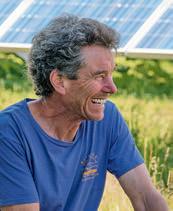
He created his own company, Lone Tree Lumber, and taught himself how to operate a sawmill to produce quality lumber for many farm projects.
Marshall was also an avid photographer and delighted in taking pictures that reflected the beauty of the farm in every season of the year. Although he already had more than a thousand photographs of the
IN MEMORIAM www.groton.org 47
P
sun setting over the Adirondacks with Lake Champlain in the foreground, he would express enormous delight in a new one that was slightly different from all of the others!
In the last decade, Marshall devoted much of his energy to the issue of climate change. He left his role as woodlands manager and became the “Carbon Drawdown” coordinator at the farm. In this capacity, he examined every use of energy on the farm and worked to shift many of these sources away from fossil fuels to renewable energy. His goal was to make the farm completely carbon neutral by his eightieth birthday in 2028. It’s a commitment that the farm has pledged to reach as part of Marshall’s ongoing legacy.
In many ways, one of Marshall’s key roles at Shelburne Farms over the past fifty years has been one of being a “dreamer.” He would envision ways to make the farm more accessible to the public, to bring students on the farm to learn about the beauty of nature, and to preserve this incredible gift of land for generations to come.
There’s a quote attributed to Bobby Kennedy that expresses Marshall’s philosophy:
“Some men see things as they are and say, why; I dream things that never were and say, why not.”
Marshall was a quiet and very effective leader. He was always much more interested in getting a project done than taking any credit for it. His generosity of spirit, his deep connection to the land, and his playful soul have had an incredibly positive impact on thousands of friends, co-workers, and family members who had the opportunity to know him.
When considering the future of the farm and his efforts to tackle climate change, Marshall thought it was critically important to “think locally.” He zealously pursued these programs because he was convinced that it was vital to successfully address these concerns at the local level if a global approach was ever to be found.
The framework for his carbon drawdown programs at Shelburne Farms demonstrates that carbon emissions can be significantly reduced in an economically sustainable manner. This is Marshall’s legacy.
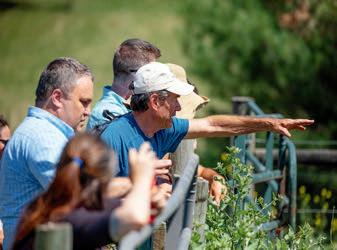
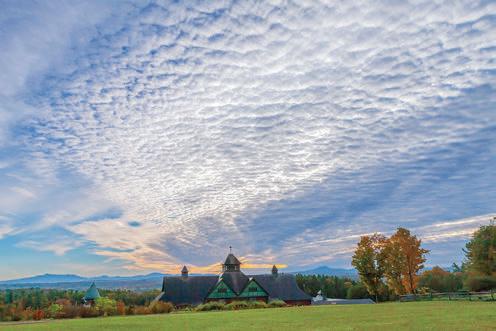
On Saturday, October 29, more than 1,000 people gathered together at the Breeding Barn on Shelburne Farms to celebrate Marshall’s extraordinary life. There were tears of sorrow for the person we had all lost, there were tears of joy for all of our memories of this remarkable person, and there were many tears of love for our wonderful opportunity of having Marshall be part of our lives.
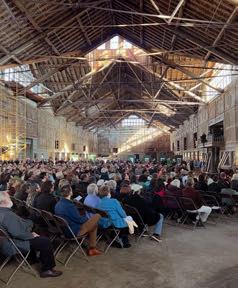
48 Groton School Quarterly Winter 2023
Clockwise from top left: July 2019 Climate Resiliency Fellowship; Marshall’s memorial service in the farm’s Breeding Barn; Shelburne Farms at sunrise.
Form notes R
Form Notes are password-protected. Members of the Groton community may read them online by signing into GrotonConnect at www.grotonalumni.network.
Giving Back
FRANCIS C. GRANT III , also known by his friends as “T,” graduated from Groton in 1961 and went on to attend the University of Pennsylvania and the Wharton School. He spent his career in real estate but was an avid traveler, sailor, and automobile enthusiast who loved being out and about, on the water or on the road, exploring the world around him.
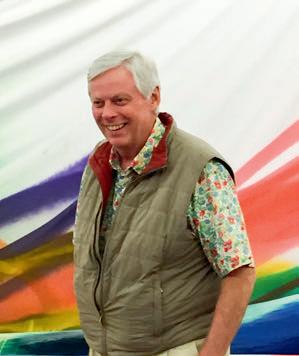
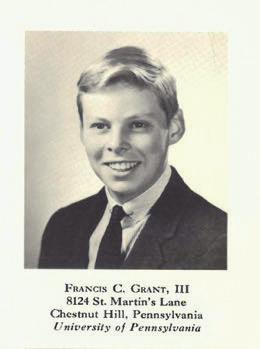
He was also a philanthropist. About 20 years ago, T had an idea to thank the faculty that helped shape his life by giving to Groton. He purchased a life insurance policy and named Groton School as the sole beneficiary and, after he passed away in January, the proceeds from that policy were designated to The Francis C. Grant 1910, 1936, 1961 Fund—honoring his father and grandfather, also Groton alumni—for the support of faculty salaries and benefits.
The Circle Society recognizes those who have included Groton School in their wills, trusts, retirement plans, or other deferred gift arrangements. Whether giving through your will, living trust, qualified retirement plan, or life insurance policy, planning ahead is an expression of commitment through a very special and important form of financial support.
To learn more, visit legacy.groton.org or contact Giulia King at 978-448-7597 or gking@groton.org.
Groton School
P.O. Box 991

Groton, Massachusetts 01450-0991




Change Service Requested

THE MONADNOCKS
and Wachusetts were the two intramural athletic clubs that competed annually in football, baseball, and rowing. The club with the most points each year had its flag displayed in front of the gymnasium (now the Dining Hall) and its name engraved on this silver cup. As the school added more sports in the early 1970s, the intramural club system was given up in favor of more JV teams and outside competition. The Monadnock and Wachusett flags now hang in the Schoolhouse, and the cup can be found in the Hundred House reading room.

Non-profit Org. U.S. Postage PAID North Reading, MA Permit 215 C I R C LING B A C K
FOLLOW GROTON:
Christopher Temerson






 Temba Maqubela Headmaster
Temba Maqubela Headmaster











































 by David Saltonstall ’82
by David Saltonstall ’82

























 by Samuel Winkler ’23 October 31, 2022
by Samuel Winkler ’23 October 31, 2022




 Edited by Robert D. Eldridge
The Memoirs of Ambassador
J. Graham Parsons: A Foreign Service Life
Edited by Robert D. Eldridge
The Memoirs of Ambassador
J. Graham Parsons: A Foreign Service Life


































 1. Jenny Polynice ‘25
2. Joon Whang ‘23
3. Tionbre Austin ‘26
4. From left, Timothy Hebard ‘24, Joon Whang ‘23, Tionbre Austin ‘26, Abi Hunnewell ‘23, and Georgia Martin ‘24
5. Abi Hunnewell ‘23
6. From left, William Laws ‘25 and Lauren Clark ‘23
7. Liam Riley ‘27
8. Timothy Hebard ‘24
9. Maya Luthi ‘23
1. Jenny Polynice ‘25
2. Joon Whang ‘23
3. Tionbre Austin ‘26
4. From left, Timothy Hebard ‘24, Joon Whang ‘23, Tionbre Austin ‘26, Abi Hunnewell ‘23, and Georgia Martin ‘24
5. Abi Hunnewell ‘23
6. From left, William Laws ‘25 and Lauren Clark ‘23
7. Liam Riley ‘27
8. Timothy Hebard ‘24
9. Maya Luthi ‘23









 by Lawrence T. Perera ’53
by Lawrence T. Perera ’53







